

28 Best Academic Search Engines That make your research easier
This post may contain affiliate links that allow us to earn a commission at no expense to you. Learn more

If you’re a researcher or scholar, you know that conducting effective online research is a critical part of your job. And if you’re like most people, you’re always on the lookout for new and better ways to do it.
I’m sure you are familiar with some research databases. But, top researchers keep an open mind and are always looking for inspiration in unexpected places.
This article aims to give you an edge over researchers that rely mainly on Google for their entire research process.
Our list of 28 academic search engines will start with the more familiar to less.
Table of Contents
#1. Google Scholar

Google Scholar is an academic search engine that indexes the full text or metadata of scholarly literature across an array of publishing formats and disciplines.
Great for academic research, you can use Google Scholar to find articles from academic journals, conference proceedings, theses, and dissertations. The results returned by Google Scholar are typically more relevant and reliable than those from regular search engines like Google.
Tip: You can restrict your results to peer-reviewed articles only by clicking on the “Scholarly”
- Scholarly results are typically more relevant and reliable than those from regular search engines like Google.
- You can restrict your results to peer-reviewed articles only by clicking on the “Scholarly” tab.
- Google Scholar database Coverage is extensive, with approx. 200 million articles indexed.
- Abstracts are available for most articles.
- Related articles are shown, as well as the number of times an article has been cited.
- Links to full text are available for many articles.
- Abstracts are only a snippet of the full article, so you might need to do additional searching to get the full information you need.
- Not all articles are available in full text.
Google Scholar is completely free.
#2. ERIC (Education Resources Information Center)
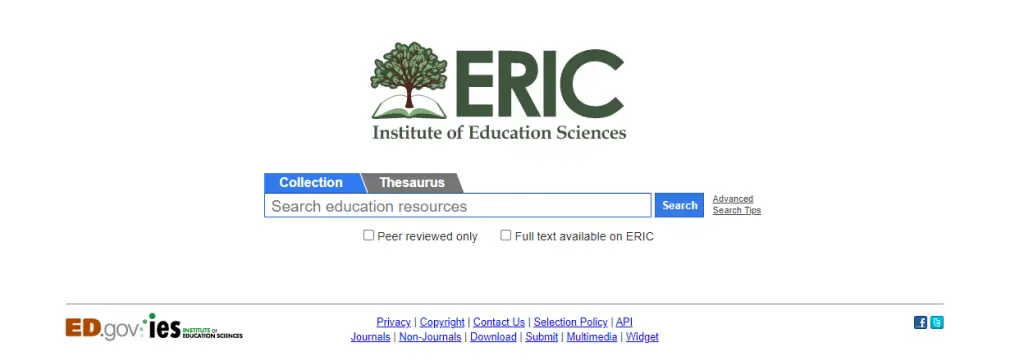
ERIC (short for educational resources information center) is a great academic search engine that focuses on education-related literature. It is sponsored by the U.S. Department of Education and produced by the Institute of Education Sciences.
ERIC indexes over a million articles, reports, conference papers, and other resources on all aspects of education from early childhood to higher education. So, search results are more relevant to Education on ERIC.
- Extensive coverage: ERIC indexes over a million articles, reports, and other resources on all aspects of education from early childhood to higher education.
- You can limit your results to peer-reviewed journals by clicking on the “Peer-Reviewed” tab.
- Great search engine for educators, as abstracts are available for most articles.
ERIC is a free online database of education-related literature.
You might also like:
- SCI Journal: Science Journal Impact Factor
- 15 Best Websites to Download Research Papers for Free
- 11 Best Academic Writing Tools For Researchers 2024
- 10 Best Reference Management Software for Research 2024
- Academic Tools
#3. Wolfram Alpha

Wolfram Alpha is a “computational knowledge engine” that can answer factual questions posed in natural language. It can be a useful search tool.
Type in a question like “What is the square root of 64?” or “What is the boiling point of water?” and Wolfram Alpha will give you an answer.
Wolfram Alpha can also be used to find academic articles. Just type in your keywords and Wolfram Alpha will generate a list of academic articles that match your query.
Tip: You can restrict your results to peer-reviewed journals by clicking on the “Scholarly” tab.
- Can answer factual questions posed in natural language.
- Can be used to find academic articles.
- Results are ranked by relevance.
- Results can be overwhelming, so it’s important to narrow down your search criteria as much as possible.
- The experience feels a bit more structured but it could also be a bit restrictive
Wolfram Alpha offers a few pricing options, including a “Pro” subscription that gives you access to additional features, such as the ability to create custom reports. You can also purchase individual articles or download them for offline use.
Pro costs $5.49 and Pro Premium costs $9.99
#4. iSEEK Education
- 15 Best Websites To Download Research Papers For Free
- 30+ Essential Software For Researchers
- 15 Best Academic Research Trend Prediction Platforms
- 15 Best Academic Networking And Collaboration Platforms
iSEEK is a search engine targeting students, teachers, administrators, and caregiver. It’s designed to be safe with editor-reviewed content.
iSEEK Education also includes a “Cited by” feature which shows you how often an article has been cited by other researchers.
- Editor-reviewed content.
- “Cited by” feature shows how often an article has been cited by other researchers.
- Limited to academic content.
- Doesn’t have the breadth of coverage that some of the other academic search engines have.
iSEEK Education is free to use.
#5. BASE (Bielefeld Academic Search Engine)
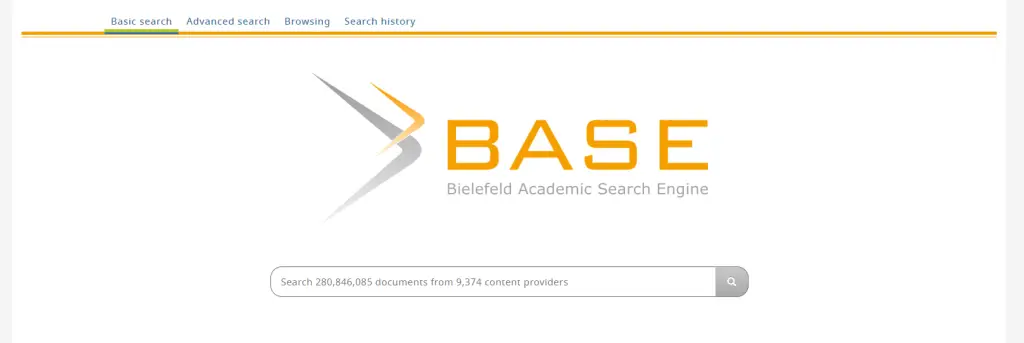
BASE is hosted at Bielefeld University in Germany and that’s where it name stems from (Bielefeld Academic Search Engine).
Known as “one of the most comprehensive academic web search engines,” it contains over 100 million documents from 4,000 different sources.
Users can narrow their search using the advanced search option, so regardless of whether you need a book, a review, a lecture, a video or a thesis, BASE has what you need.
BASE indexes academic articles from a variety of disciplines, including the arts, humanities, social sciences, and natural sciences.
- One of the world’s most voluminous search engines,
- Indexes academic articles from a variety of disciplines, especially for academic web resources
- Includes an “Advanced Search” feature that lets you restrict your results to peer-reviewed journals.
- Doesn’t include abstracts for most articles.
- Doesn’t have related articles, references, cited by
BASE is free to use.
- 10 Best Reference Management Software for Research 2023
- 15 Best Academic Networking and Collaboration Platforms
- 30+ Essential Software for Researchers
- 15 Best Academic Blogging and Content Management
- 11 Best Academic Writing Tools For Researchers
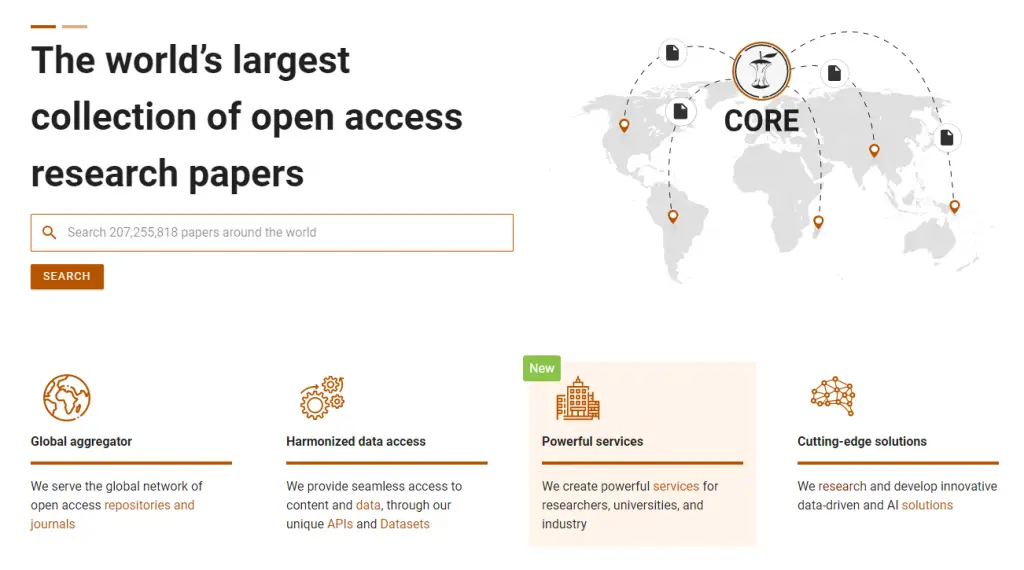
CORE is an academic search engine that focuses on open access research papers. A link to the full text PDF or complete text web page is supplied for each search result. It’s academic search engine dedicated to open access research papers.
- Focused on open access research papers.
- Links to full text PDF or complete text web page are supplied for each search result.
- Export formats include BibTeX, Endnote, RefWorks, Zotero.
- Coverage is limited to open access research papers.
- No abstracts are available for most articles.
- No related articles, references, or cited by features.
CORE is free to use.
- Best Plagiarism Checkers for Research Papers in 2024
#7. Science.gov

Science.gov is a search engine developed and managed by the United States government. It includes results from a variety of scientific databases, including NASA, EPA, USGS, and NIST.
US students are more likely to have early exposure to this tool for scholarly research.
- Coverage from a variety of scientific databases (200 million articles and reports).
- Links to full text are available for some articles.
Science.gov is free to use.
- 15 Best Academic Journal Discovery Platforms
- Sci Hub Review
#8. Semantic Scholar

Semantic Scholar is a recent entrant to the field. Its goal is to provide more relevant and effective search results via artificial intelligence-powered methods that detect hidden relationships and connections between research topics.
- Powered by artificial intelligence, which enhances search results.
- Covers a large number of academic articles (approx. 40 million).
- Related articles, references, and cited by features are all included.
- Links to full text are available for most articles.
Semantic Scholar is free to use.
- 11 Best Academic Writing Tools For Researchers
- 10 Best Reference Management Software for Research
- 15 Best Academic Journal Discovery Platforms
#9. RefSeek

RefSeek searches more than five billion documents, including web pages, books, encyclopedias, journals, and newspapers.
This is one of the free search engines that feels like Yahoo with a massive directory. It could be good when you are just looking for research ideas from unexpected angles. It could lead you to some other database that you might not know such as the CIA The World Factbook, which is a great reference tool.
- Searches more than five billion documents.
- The Documents tab is very focused on research papers and easy to use.
- Results can be filtered by date, type of document, and language.
- Good source for free academic articles, open access journals, and technical reports.
- The navigation and user experience is very dated even to millenials…
- It requires more than 3 clicks to dig up interesting references (which is how it could lead to you something beyond the 1st page of Google)
- The top part of the results are ALL ads (well… it’s free to use)
RefSeek is free to use.
#10. ResearchGate
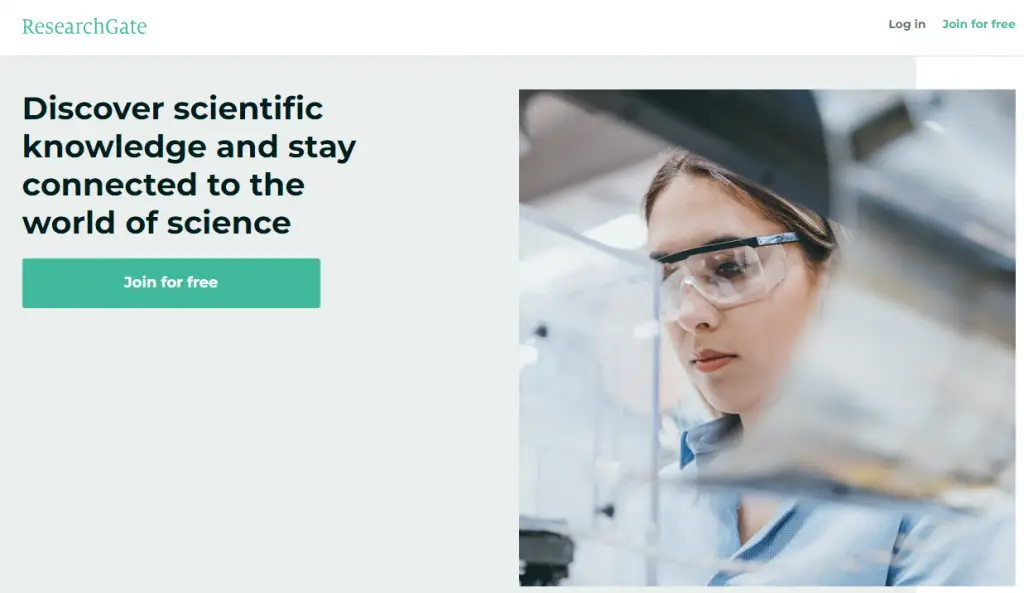
A mixture of social networking site + forum + content databases where researchers can build their profile, share research papers, and interact with one another.
Although it is not an academic search engine that goes outside of its site, ResearchGate ‘s library of works offers an excellent choice for any curious scholar.
There are more than 100 million publications available on the site from over 11 million researchers. It is possible to search by publication, data, and author, as well as to ask the researchers questions.
- A great place to find research papers and researchers.
- Can follow other researchers and get updates when they share new papers or make changes to their profile.
- The network effect can be helpful in finding people who have expertise in a particular topic.
- Interface is not as user friendly
- Can be overwhelming when trying to find relevant papers.
- Some papers are behind a paywall.
ResearchGate is free to use.
- 15 Best Academic Research Trend Prediction Platforms
- 25 Best Tools for Tracking Research Impact and Citations
#11. DataONE Search (formerly CiteULike)
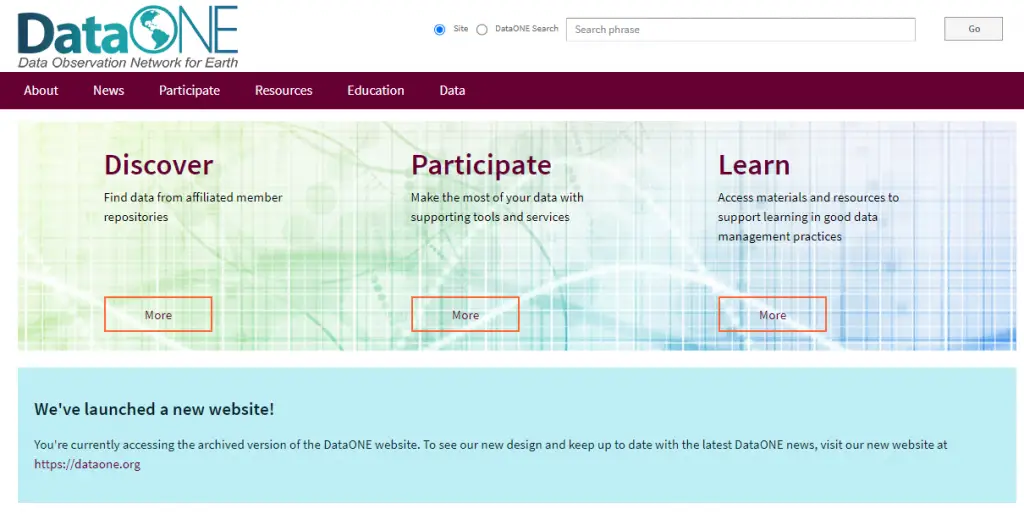
A social networking site for academics who want to share and discover academic articles and papers.
- A great place to find academic papers that have been shared by other academics.
- Some papers are behind a paywall
CiteULike is free to use.
#12. DataElixir

DataElixir is deigned to help you find, understand and use data. It includes a curated list of the best open datasets, tools and resources for data science.
- Dedicated resource for finding open data sets, tools, and resources for data science.
- The website is easy to navigate.
- The content is updated regularly
- The resources are grouped by category.
- Not all of the resources are applicable to academic research.
- Some of the content is outdated.
DataElixir is free to use.
#13. LazyScholar – browser extension
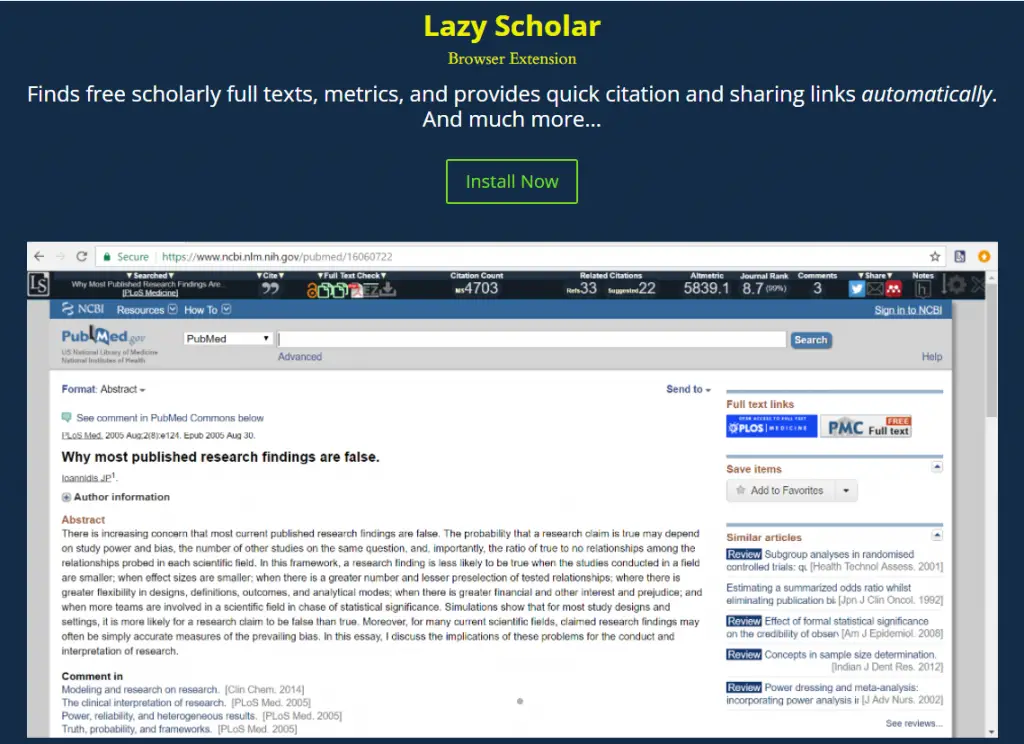
LazyScholar is a free browser plugin that helps you discover free academic full texts, metrics, and instant citation and sharing links. Lazy Scholar is created Colby Vorland, a postdoctoral fellow at Indiana University.
- It can integrate with your library to find full texts even when you’re off-campus.
- Saves your history and provides an interface to find it.
- A pre-formed citation is availlable in over 900 citation styles.
- Can recommend you topics and scans new PubMed listings to suggest new papers
- Results can be a bit hit or miss
LazyScholar is free to use.
#14. CiteseerX – digital library from PenState

CiteseerX is a digital library stores and indexes research articles in Computer Science and related fields. The site has a robust search engine that allows you to filter results by date, author.
- Searches a large number of academic papers.
- Results can be filtered by date, author, and topic.
- The website is easy to use.
- You can create an account and save your searches for future reference.
CiteseerX is free to use.
- Surfer Review: Is It Worth It?
- 25 Best Tools For Tracking Research Impact And Citations
#15. The Lens – patents search
The Lens or the Patent Lens is an online patent and scholarly literature search facility, provided by Cambia, an Australia-based non-profit organization.

- Searches for a large number of academic papers.
The price range can be free for non-profit use to $5,000 for commercial enterprise.
#16. Fatcat – wiki for bibliographic catalog
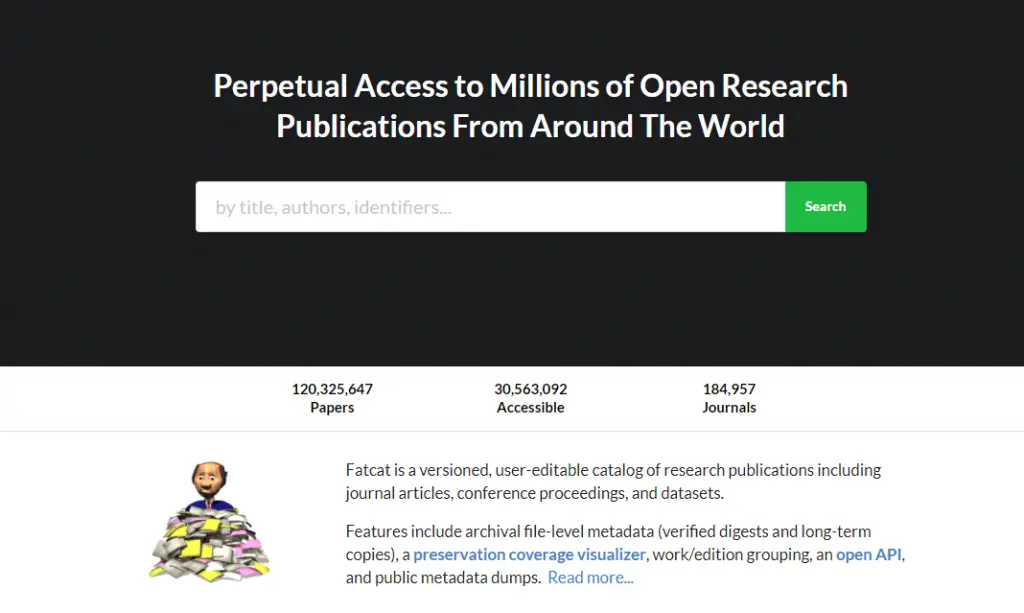
Fatcat is an open bibliographic catalog of written works. The scope of works is somewhat flexible, with a focus on published research outputs like journal articles, pre-prints, and conference proceedings. Records are collaboratively editable, versioned, available in bulk form, and include URL-agnostic file-level metadata.
- Open source and collaborative
- You can be part of the community that is very focused on its mission
- The archival file-level metadata (verified digests and long-term copies) is a great feature.
- Could prove to be another rabbit hole
- People either love or hate the text-only interface
#17. Lexis Web – Legal database
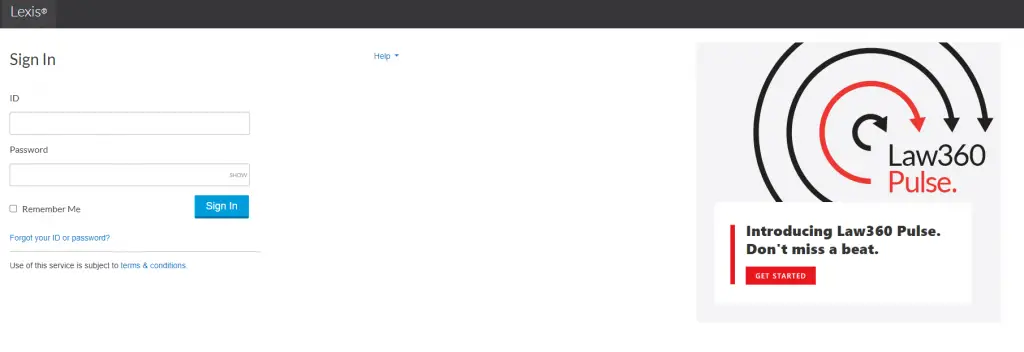
Are you researching legal topics? You can turn to Lexis Web for any law-related questions you may have. The results are drawn from legal sites and can be filtered based on criteria such as news, blogs, government, and commercial. Additionally, users can filter results by jurisdiction, practice area, source and file format.
- Results are drawn from legal sites.
- Filters are available based on criteria such as news, blogs, government, and commercial.
- Users can filter results by jurisdiction, practice area, source and file format.
- Not all law-related questions will be answered by this search engine.
- Coverage is limited to legal sites only.
Lexis Web is free for up to three searches per day. After that, a subscription is required.
#18. Infotopia – part of the VLRC family
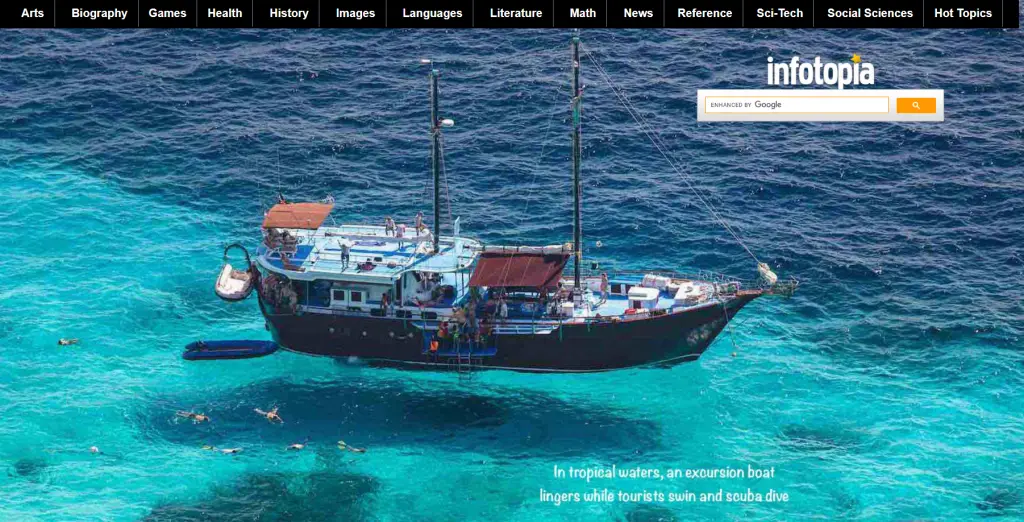
Infotopia touts itself as an “alternative to Google safe search.” Scholarly book results are curated by librarians, teachers, and other educational workers. Users can select from a range of topics such as art, health, and science and technology, and then see a list of resources pertaining to the topic.
Consequently, if you aren’t able to find what you are looking for within Infotopia’s pages, you will probably find it on one of its many suggested websites.
#19. Virtual Learning Resources Center
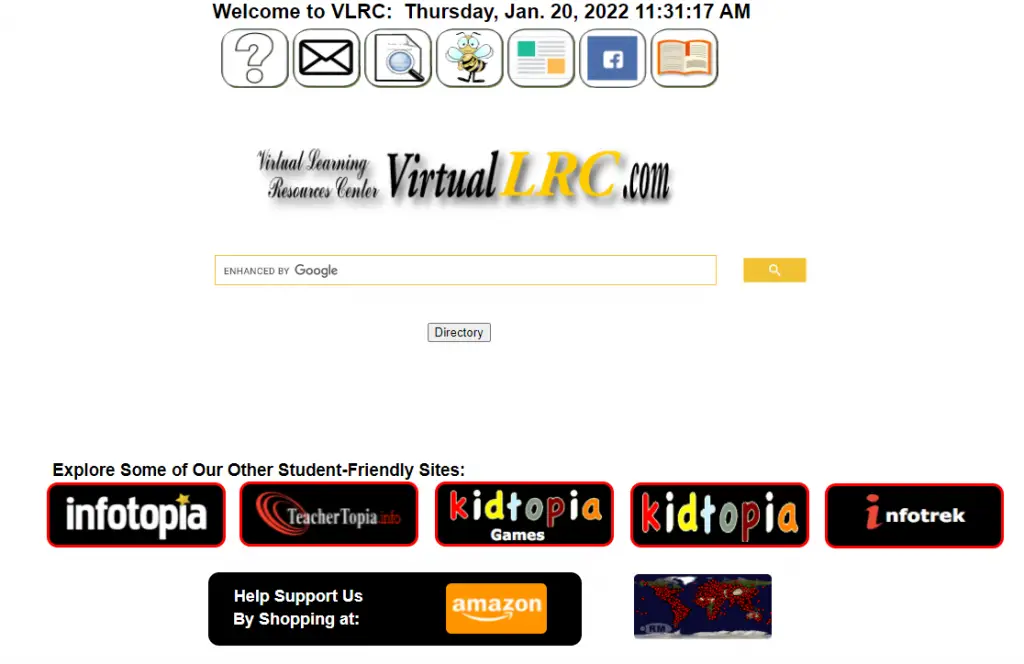
Virtual Learning Resources Center (VLRC) is an academic search engine that features thousands of academic sites chosen by educators and librarians worldwide. Using an index generated from a research portal, university, and library internet subject guides, students and instructors can find current, authoritative information for school.
- Thousands of academic information websites indexed by it. You will also be able to get more refined results with custom Google search, which will speed up your research.
- Many people consider VLRC as one of the best free search engines to start looking for research material.
- TeachThought rated the Virtual LRC #3 in it’s list of 100 Search Engines For Academic Research
- More relevant to education
- More relevant to students

Powered by Google Custom Search Engine (CSE), Jurn is a free online search engine for accessing and downloading free full-text scholarly papers. It was created by David Haden in a public open beta version in February 2009, initially for locating open access electronic journal articles in the arts and humanities.
After the indexing process was completed, a website containing additional public directories of web links to indexed publications was introduced in mid-2009. The Jurn search service and directory has been regularly modified and cleaned since then.
- A great resource for finding academic papers that are behind paywalls.
- The content is updated regularly.uren
Jurn is free to use.
#21. WorldWideScience
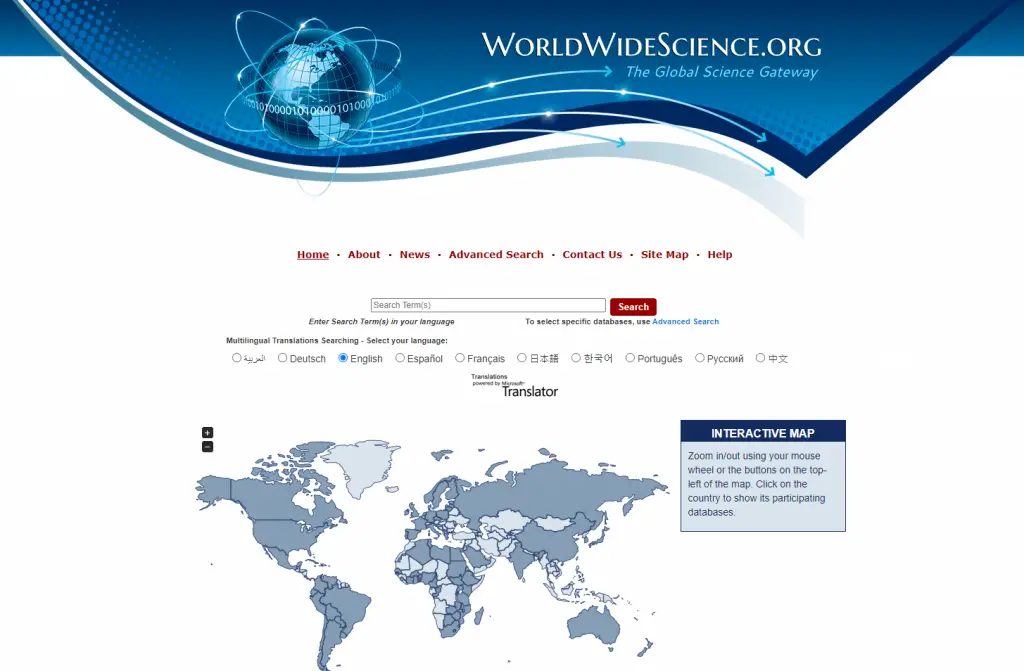
The Office of Scientific and Technical Information—a branch of the Office of Science within the U.S. Department of Energy—hosts the portal WorldWideScience , which has dubbed itself “The Global Science Gateway.”
Over 70 countries’ databases are used on the website. When a user enters a query, it contacts databases from all across the world and shows results in both English and translated journals and academic resources.
- Results can be filtered by language and type of resource
- Interface is easy to use
- Contains both academic journal articles and translated academic resources
- The website can be difficult to navigate.
WorldWideScience is free to use.
#22. Google Books
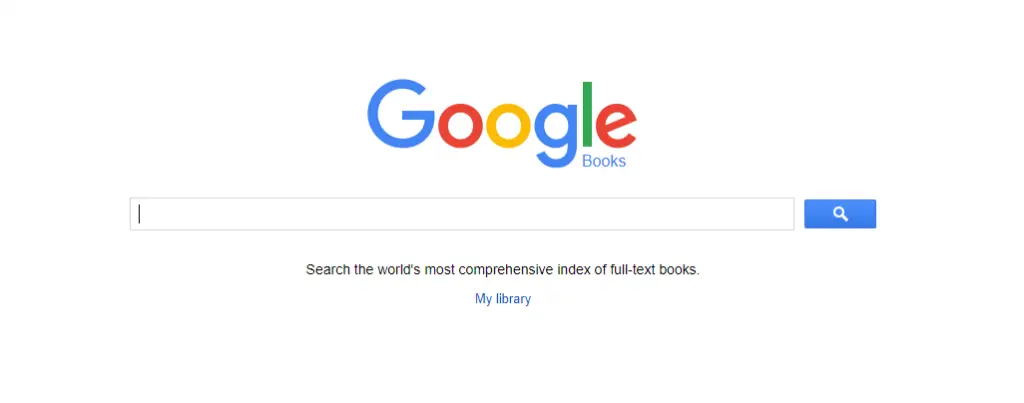
A user can browse thousands of books on Google Books, from popular titles to old titles, to find pages that include their search terms. You can look through pages, read online reviews, and find out where to buy a hard copy once you find the book you are interested in.
#23. DOAJ (Directory of Open Access Journals)
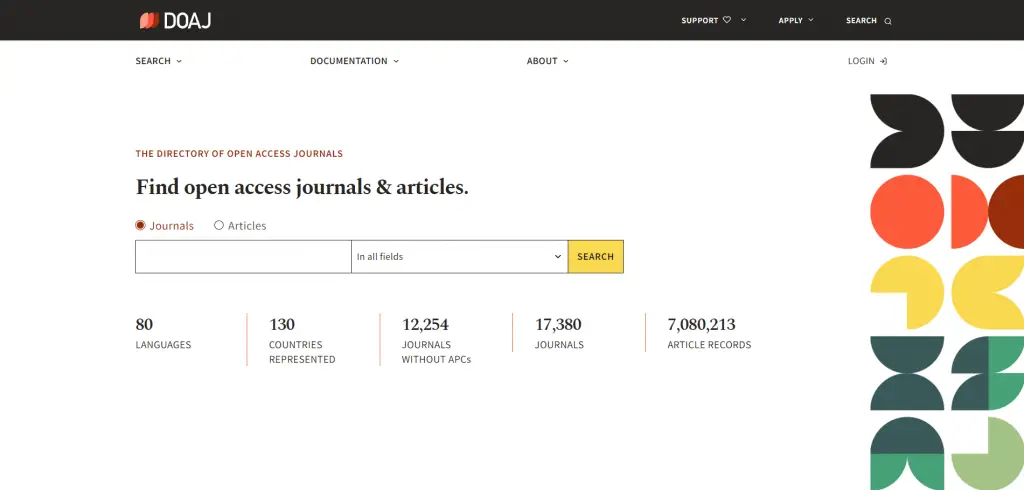
DOAJ is a free search engine for scientific and scholarly materials. It is a searchable database with over 8,000 peer-reviewed research papers organized by subject. It’s one of the most comprehensive libraries of scientific and scholarly resources, with over 8,000 journals available on a variety of themes.
#24. Baidu Scholar

Baidu Xueshu (Academic) is the Chinese version for Google Scholar. IDU Scholar indexes academic papers from a variety of disciplines in both Chinese and English.
- Articles are available in full text PDF.
- Covers a variety of academic disciplines.
- No abstracts are available for most articles, but summaries are provided for some.
- A great portal that takes you to different specialized research platform
- You need to be able to read Chinese to use the site
- Since 2021 there is a rise of focus on China and the Chinese Communist Party
Baidu Scholar is free to use.
#25. PubMed Central
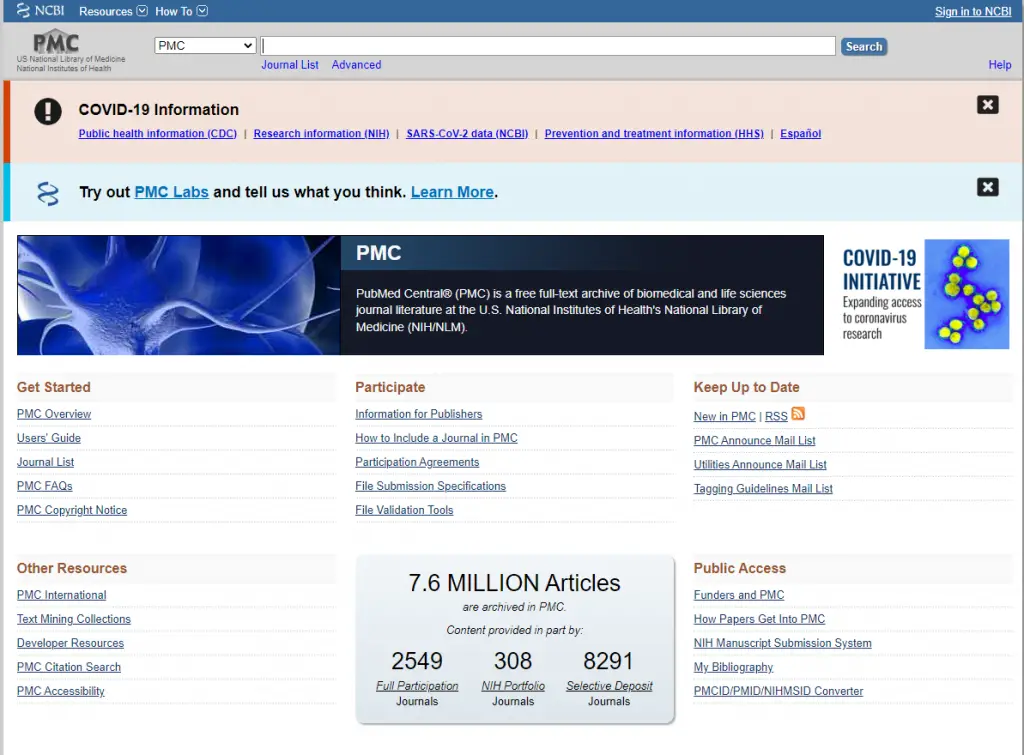
PubMed is a free search engine that provides references and abstracts for medical, life sciences, and biomedical topics.
If you’re studying anything related to healthcare or science, this site is perfect. PublicMed Central is operated by the National Center for Biotechnology Information, a division of the U.S. National Library of Medicine. It contains more than 3 million full-text journal articles.
It’s similar to PubMed Health, which focuses on health-related research and includes abstracts and citations to over 26 million articles.
#26. MEDLINE®
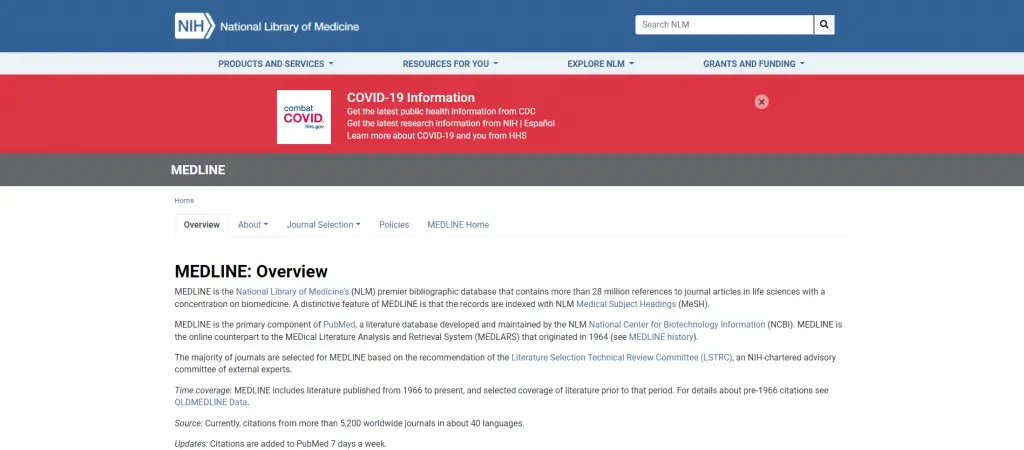
MEDLINE® is a paid subscription database for life sciences and biomedicine that includes more than 28 million citations to journal articles. For finding reliable, carefully chosen health information, Medline Plus provides a powerful search tool and even a dictionary.
- A great database for life sciences and biomedicine.
- Contains more than 28 million references to journal articles.
- References can be filtered by date, type of document, and language.
- The database is expensive to access.
- Some people find it difficult to navigate and find what they are looking for.
MEDLINE is not free to use ( pricing information ).
Defunct Academic Search Engines
#27. microsoft academic .
Microsoft Academic
Microsoft Academic Search seemed to be a failure from the beginning. It ended in 2012, then re-launched in 2016 as Microsoft Academic. It provides the researcher with the opportunity to search academic publications,
Microsoft Academic used to be the second-largest academic search engine after Google Scholar. Microsoft Academic provides a wealth of data for free, but Microsoft has announced that it will shut Microsoft Academic down in by 2022.
#28. Scizzle
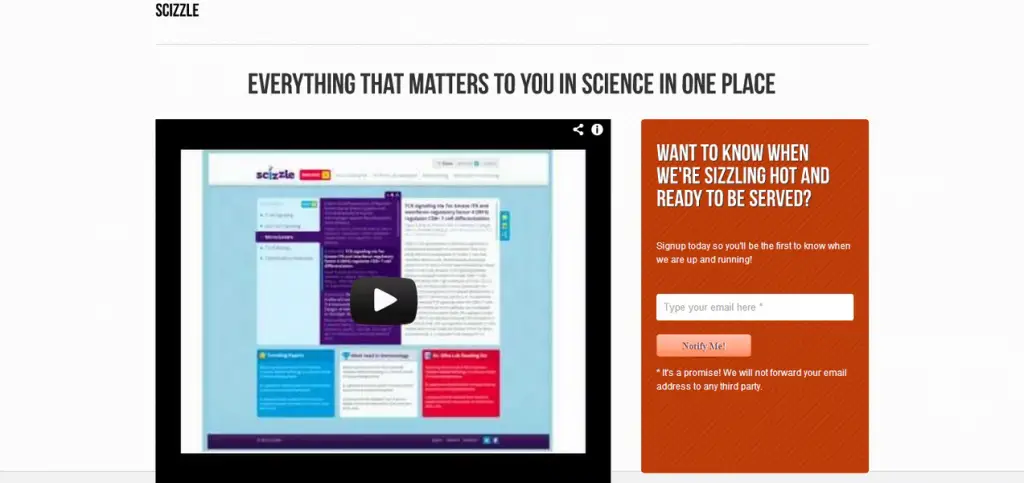
Designed to help researchers stay on top of the literature by setting up email alerts, based on key terms, for newspapers.
Unfortunately, academic search engines come and go. These are two that are no longer available.
Final Thoughts
There are many academic search engines that can help researchers and scholars find the information they need. This list provides a variety of options, starting with more familiar engines and moving on to less well-known ones.
Keeping an open mind and exploring different sources is essential for conducting effective online research. With so much information at our fingertips, it’s important to make sure we’re using the best tools available to us.
Tell us in the comment below which academic search engine have you not heard of? Which database do you think we should add? What database do your professional societies use? What are the most useful academic websites for research in your opinion?
There is more.
Check out our other articles on the Best Academic Tools Series for Research below.
- Learn how to get more done with these Academic Writing Tools
- Learn how to proofread your work with these Proofreading Tools
- Learn how to broaden your research landscape with these Academic Search Engines
- Learn how to manage multiple research projects with these Project Management Tools
- Learn how to run effective survey research with these Survey Tools for Research
- Learn how get more insights from important conversations and interviews with Transcription Tools
- Learn how to manage the ever-growing list of references with these Reference Management Software
- Learn how to double your productivity with literature reviews with these AI-Based Summary Generators
- Learn how to build and develop your audience with these Academic Social Network Sites
- Learn how to make sure your content is original and trustworthy with these Plagiarism Checkers
- Learn how to talk about your work effectively with these Science Communication Tools
10 thoughts on “28 Best Academic Search Engines That make your research easier”
Thank you so much Joannah..I have found this information useful to me as librarian in an academic library
You are welcome! We are happy to hear that!
Thank You Team, for providing a comprehensive list of academic search engines that can help make research easier for students and scholars. The variety of search engines included offers a range of options for finding scholarly articles, journals, and other academic resources. The article also provides a brief summary of each search engine’s features, which helps in determining which one is the best fit for a specific research topic. Overall, this article is a valuable resource for anyone looking for a quick and easy way to access a wealth of academic information.
Thank you for taking the time to share your feedback with us. We are delighted to hear that you found our list of academic search engines helpful in making research easier for students and scholars. We understand the importance of having a variety of options when it comes to finding scholarly articles, journals, and other academic resources, and we strive to provide a comprehensive list of resources to meet those needs.
We are glad that you found the brief summary of each search engine’s features helpful in determining which one is the best fit for a specific research topic. Our goal is to make it easy for our readers to access valuable academic information and we’re glad that we were able to achieve that for you.
We appreciate your support and thank you for your kind words. We will continue to provide valuable resources for students and researchers in the future. Please let us know if you have any further questions or suggestions.
No more questions Thank You
I cannot thank you enough!!! thanks alot 🙂
Typography animation is a technique that combines text and motion to create visually engaging and dynamic animations. It involves animating individual letters, words, or phrases in various ways to convey a message, evoke emotions, or enhance the visual impact of a design or video. – Typography Animation Techniques Tools and Online Software {43}
Hi Joannah! Here’s another one you may want to add! Expontum ( https://www.expontum.com/ ) – Helps researchers quickly find knowledge gaps and identify what research projects have been completed before. Thanks!
Expontum – Helps researchers quickly find knowledge gaps and identify what research projects have been completed before. Expontum is free, open access, and available to all globally with no paid versions of the site. Automated processes scan research article information 24/7 so this website is constantly updating. By looking at over 35 million research publications (240 million by the end of 2023), the site has 146 million tagged research subjects and 122 million tagged research attributes. Learn more about methodology and sources on the Expontum About Page ( https://www.expontum.com/about.php )
Hey Ryan, I clicked and checked your site and thought it was very relevant to our reader. Thank you for sharing. And, we will be reviewing your site soon.
Sounds good! Thanks, Joannah!
Leave a Comment Cancel reply
Save my name, email, and website in this browser for the next time I comment.
We maintain and update science journals and scientific metrics. Scientific metrics data are aggregated from publicly available sources. Please note that we do NOT publish research papers on this platform. We do NOT accept any manuscript.
2012-2024 © scijournal.org
Stand on the shoulders of giants
Google Scholar provides a simple way to broadly search for scholarly literature. From one place, you can search across many disciplines and sources: articles, theses, books, abstracts and court opinions, from academic publishers, professional societies, online repositories, universities and other web sites. Google Scholar helps you find relevant work across the world of scholarly research.

How are documents ranked?
Google Scholar aims to rank documents the way researchers do, weighing the full text of each document, where it was published, who it was written by, as well as how often and how recently it has been cited in other scholarly literature.
Features of Google Scholar
- Search all scholarly literature from one convenient place
- Explore related works, citations, authors, and publications
- Locate the complete document through your library or on the web
- Keep up with recent developments in any area of research
- Check who's citing your publications, create a public author profile

Disclaimer: Legal opinions in Google Scholar are provided for informational purposes only and should not be relied on as a substitute for legal advice from a licensed lawyer. Google does not warrant that the information is complete or accurate.
- Privacy & Terms
18 Google Scholar tips all students should know
Dec 13, 2022
[[read-time]] min read
Think of this guide as your personal research assistant.

“It’s hard to pick your favorite kid,” Anurag Acharya says when I ask him to talk about a favorite Google Scholar feature he’s worked on. “I work on product, engineering, operations, partnerships,” he says. He’s been doing it for 18 years, which as of this month, happens to be how long Google Scholar has been around.
Google Scholar is also one of Google’s longest-running services. The comprehensive database of research papers, legal cases and other scholarly publications was the fourth Search service Google launched, Anurag says. In honor of this very important tool’s 18th anniversary, I asked Anurag to share 18 things you can do in Google Scholar that you might have missed.
1. Copy article citations in the style of your choice.
With a simple click of the cite button (which sits below an article entry), Google Scholar will give you a ready-to-use citation for the article in five styles, including APA, MLA and Chicago. You can select and copy the one you prefer.
2. Dig deeper with related searches.
Google Scholar’s related searches can help you pinpoint your research; you’ll see them show up on a page in between article results. Anurag describes it like this: You start with a big topic — like “cancer” — and follow up with a related search like “lung cancer” or “colon cancer” to explore specific kinds of cancer.

Related searches can help you find what you’re looking for.
3. And don’t miss the related articles.
This is another great way to find more papers similar to one you found helpful — you can find this link right below an entry.
4. Read the papers you find.
Scholarly articles have long been available only by subscription. To keep you from having to log in every time you see a paper you’re interested in, Scholar works with libraries and publishers worldwide to integrate their subscriptions directly into its search results. Look for a link marked [PDF] or [HTML]. This also includes preprints and other free-to-read versions of papers.
5. Access Google Scholar tools from anywhere on the web with the Scholar Button browser extension.
The Scholar Button browser extension is sort of like a mini version of Scholar that can move around the web with you. If you’re searching for something, hitting the extension icon will show you studies about that topic, and if you’re reading a study, you can hit that same button to find a version you read, create a citation or to save it to your Scholar library.

Install the Scholar Button Chrome browser extension to access Google Scholar from anywhere on the web.
6. Learn more about authors through Scholar profiles.
There are many times when you’ll want to know more about the researchers behind the ideas you’re looking into. You can do this by clicking on an author’s name when it’s hyperlinked in a search result. You’ll find all of their work as well as co-authors, articles they’re cited in and so on. You can also follow authors from their Scholar profile to get email updates about their work, or about when and where their work is cited.
7. Easily find topic experts.
One last thing about author profiles: If there are topics listed below an author’s name on their profile, you can click on these areas of expertise and you’ll see a page of more authors who are researching and publishing on these topics, too.
8. Search for court opinions with the “Case law” button.
Scholar is the largest free database of U.S. court opinions. When you search for something using Google Scholar, you can select the “Case law” button below the search box to see legal cases your keywords are referenced in. You can read the opinions and a summary of what they established.
9. See how those court opinions have been cited.
If you want to better understand the impact of a particular piece of case law, you can select “How Cited,” which is below an entry, to see how and where the document has been cited. For example, here is the How Cited page for Marbury v. Madison , a landmark U.S. Supreme Court ruling that established that courts can strike down unconstitutional laws or statutes.
10. Understand how a legal opinion depends on another.
When you’re looking at how case laws are cited within Google Scholar, click on “Cited by” and check out the horizontal bars next to the different results. They indicate how relevant the cited opinion is in the court decision it’s cited within. You will see zero, one, two or three bars before each result. Those bars indicate the extent to which the new opinion depends on and refers to the cited case.

In the Cited by page for New York Times Company v. Sullivan, court cases with three bars next to their name heavily reference the original case. One bar indicates less reliance.
11. Sign up for Google Scholar alerts.
Want to stay up to date on a specific topic? Create an alert for a Google Scholar search for your topics and you’ll get email updates similar to Google Search alerts. Another way to keep up with research in your area is to follow new articles by leading researchers. Go to their profiles and click “Follow.” If you’re a junior grad student, you may consider following articles related to your advisor’s research topics, for instance.
12. Save interesting articles to your library.
It’s easy to go down fascinating rabbit hole after rabbit hole in Google Scholar. Don’t lose track of your research and use the save option that pops up under search results so articles will be in your library for later reading.
13. Keep your library organized with labels.
Labels aren’t only for Gmail! You can create labels within your Google Scholar library so you can keep your research organized. Click on “My library,” and then the “Manage labels…” option to create a new label.
14. If you’re a researcher, share your research with all your colleagues.
Many research funding agencies around the world now mandate that funded articles should become publicly free to read within a year of publication — or sooner. Scholar profiles list such articles to help researchers keep track of them and open up access to ones that are still locked down. That means you can immediately see what is currently available from researchers you’re interested in and how many of their papers will soon be publicly free to read.
15. Look through Scholar’s annual top publications and papers.
Every year, Google Scholar releases the top publications based on the most-cited papers. That list (available in 11 languages) will also take you to each publication’s top papers — this takes into account the “h index,” which measures how much impact an article has had. It’s an excellent place to start a research journey as well as get an idea about the ideas and discoveries researchers are currently focused on.
16. Get even more specific with Advanced Search.
Click on the hamburger icon on the upper left-hand corner and select Advanced Search to fine-tune your queries. For example, articles with exact words or a particular phrase in the title or articles from a particular journal and so on.
17. Find extra help on Google Scholar’s help page.
It might sound obvious, but there’s a wealth of useful information to be found here — like how often the database is updated, tips on formatting searches and how you can use your library subscriptions when you’re off-campus (looking at you, college students!). Oh, and you’ll even learn the origin of that quote on Google Scholar’s home page.

18. Keep up with Google Scholar news.
Don’t forget to check out the Google Scholar blog for updates on new features and tips for using this tool even better.
Related stories
Ai overviews: about last week.
Here’s what happened with AI Overviews, the feedback we've received, and the steps we’ve taken.

Doodle for Google’s top 55 artists share their wishes for the future

Generative AI in Search: Let Google do the searching for you

A new Mother's Day gift experience on Google Search

Celebrate spring with floral illustrations on Google Books

Find more sustainable ways to get around, with new Maps and Search updates
Let’s stay in touch. Get the latest news from Google in your inbox.
Google Scholar
Using Google Scholar with your HarvardKey allows you to make the most of provided links, granting access to full text available through Harvard Library subscriptions.
Google Scholar can quickly surface highly cited peer-reviewed articles, abstracts, books, patents, scholarly web pages, and more.
Explore Google Scholar
Connect Google Scholar To Your Library Access
Connecting Google Scholar to your Harvard Library access is a good way to make sure you get access to articles that Harvard Library subscribes to.
Here's how:
- Go to Google Scholar and sign in to your Google account
- Look for the menu options
- Go into the settings and select "Library links"
- Type in Harvard and select: Harvard University - Try Harvard Library
- Deselect the box for WorldCat if shown
- Save your preferences
- Search your topic and look for the "Try Harvard Library" links to the right of the articles. This link should take you to Harvard's access to that item
Google Scholar Tips
- Like Google, Google Scholar allows searching of metadata terms, but unlike Google, it also indexes full text.
- Choose the default search or select “Advanced search” to search by title, author, journal, and date.
- For more advanced researchers, it is possible to specify phrases in quotation marks, enter Boolean queries, or search within fields.
- You may also create an account to set up your author profile or sign up for alerts.
- In settings, you may elect to limit your search by language and show citation import links.
- Results are returned in relevance-ranked order, generally favoring entries when search terms appear in document titles and prioritizing documents with larger citation counts.
Top 10 Best Academic Search Engines for Scholarly Articles in 2024
Jc Chaithanya
14 min read
Best Search Engines to Search for Scientific Papers at a Glance
Top 10 best search engines to search for scientific papers, google scholar key features , google scholar reviews , base key features , base reviews , scispace key features, scispace reviews , core key features , core reviews , scopus key features , scopus reviews, pubmed key features , pubmed reviews , jstor key features , jstor reviews , science.gov key features , science.gov reviews , semantic scholar key features , semantic scholar reviews , baidu scholar key features , baidu scholar reviews , our selection criteria to pick search engines for search for scientific papers, how to choose the best search engine to search for scientific papers, elephas: the research assistant that halves your research time, conclusion , 1. where can i search for scientific papers, 2. how do you search for scientific papers effectively, 3. how to find research papers on google.
Research is the cornerstone of scientific discovery. However, sifting through the vast amount of scholarly literature can feel overwhelming. Fear not, intrepid researchers! Today, we will equip you with the top 10 search engines designed specifically to streamline your search for scientific papers.
We'll delve into the strengths of each platform, helping you identify the perfect tool for your specific research needs. Whether you're seeking a broad overview or a deep dive into a niche topic, our analysis will ensure you learn about the most relevant and reliable search engines to propel your research forward.
To further maximize your research efficiency, we'll also introduce you to Elephas, a powerful AI writing assistant that can revolutionize your research paper writing process. However, we'll save that discussion for later in our article. For now, let's delve into the best search engines to search for scientific papers.
Google Scholar: General search for scholarly literature across various disciplines.
BASE: Free search engine for scholarly articles with summaries and full-text links.
SciSpace: Powerful search engine with AI-powered recommendations for related research.
CORE: User-friendly search engine for open-access scholarly publications.
Scopus: Search engine for high-quality, peer-reviewed scientific publications.
PubMed: Free search engine for biomedical and life sciences literature.
JSTOR: Comprehensive digital library for scholarly articles, ebooks, and primary sources across disciplines.
Science.gov: Free search engine for scientific research from US government agencies.
Semantic Scholar: Uses AI to find relevant research papers and uncover hidden connections.
Baidu Scholar: Search engine for academic literature in Chinese
1. Google Scholar

Google Scholar simplifies searching for scholarly literature. It crawls millions of academic publications across various disciplines, including articles, theses, books, and conference papers. Researchers can set up alerts to stay updated on new publications in their field. Google Scholar is like Google Search but specifically designed for academic research.
Massive Database: Search roughly 200 million scholarly articles.
Find Freely Available Papers: Locate research papers and often access full PDFs.
Stay Updated: Set alerts for new publications in your field.
Explore Research: Discover related articles, references, and citations.
Easy Citation Management: Export citations in various formats.
Formatting: Easily export your search results into common citation formats like APA and MLA.
We could not find any public reviews on Google Scholar, so we advise users to stay cautious when using the search engine.
2. Base

BASE (Bielefeld Academic Search Engine) is a free search engine specializing in scholarly articles. With over 136 million publications (including duplicates), BASE allows you to search for research papers across various disciplines. It provides summaries and links to full text whenever available. While BASE doesn't offer features like finding related articles, cited references, or who cited the paper, it excels in its core function: searching for scientific publications effortlessly.
Free Search Engine: Access millions of scholarly publications without any cost.
Focus on Academic Content: Search a vast collection of research papers across various fields.
Article Summaries: Quickly grasp the research topic with summaries (abstracts) provided for each article.
Full Text Links: When available, access the full scientific paper directly through BASE.
Simple Interface: Navigate BASE's user-friendly interface to find what you need efficiently.
We could not find any public reviews on Base search engine, so we advise users to stay cautious when using the search engine.
3. Scispace

SciSpace is a powerful search engine specifically designed for academic research. With over 300 million scholarly articles across various fields, SciSpace utilizes advanced algorithms to deliver relevant search results. Its user-friendly interface makes navigating millions of research papers simple for both beginners and experienced researchers.
Massive Academic Database: Search over 300 million scholarly articles.
Advanced Search & Filters: Find relevant papers by author, citation count, and more.
AI-powered Recommendations: Get suggestions for related research based on your search.
Integrated Research Tools: Read papers, conduct literature reviews, and generate citations.
User-friendly Interface: Easy to navigate for both novice and experienced researchers.

CORE is a user-friendly search engine designed specifically for scholarly research papers. Unlike traditional search engines, CORE focuses on freely accessible, open-access publications. This means you can easily find millions of scientific articles without any paywalls or restrictions. Every search result on CORE conveniently links directly to the full-text PDF or webpage of the research paper, allowing you to dive deeper into your chosen topic
Vast Collection: Search through over 136 million academic publications.
Full Text Access: Every search result includes a link to the complete article, either in PDF or on the publisher's webpage.
Enhanced Discovery: Easily explore related articles to broaden your research scope.
Simple Interface: CORE's user-friendly design lets you find what you need quickly and efficiently.
Focus on Open Access: CORE prioritizes freely available research, ensuring you can access the latest scientific findings without restrictions.
We could not find any public reviews on Core Search engine, so we advise users to stay cautious when using the search engine.

Scopus is a search engine for scientific research. It helps researchers find scholarly articles, conference papers, and patents. Unlike regular search engines, Scopus focuses on high-quality, peer-reviewed publications. This ensures you find reliable information to support your research. Scopus also offers advanced search options to help you narrow down your search and find relevant papers quickly.
Extensive Coverage: Search millions of peer-reviewed publications across various disciplines.
Accurate Search: Find relevant research with advanced search options and filters.
Verified Content: Explore high-quality, trusted publications with a focus on peer review.
Author Tracking: Monitor the impact of your research by tracking citations and authorship.
Discover Connections: Explore how different research papers are linked and build upon each other.

PubMed , a free search engine developed by the National Center for Biotechnology Information (NCBI), specializes in biomedical and life sciences literature. Offering a vast collection of scholarly articles, journals, clinical trials, and more, PubMed is a trusted resource for medical professionals, researchers, students, and anyone seeking scientific information.
Extensive Collection: Search millions of scientific citations in medicine, health sciences, and related fields.
Accurate Results: PubMed's curated database ensures the quality and trustworthiness of your search results.
Advanced Search Options: Refine your search using keywords, MeSH (Medical Subject Headings) terms, publication dates, and more.
User-Friendly Interface: The search engine features a user-friendly interface for efficient exploration of scientific data.
We could not find any public reviews on Pubmed, so we advise users to stay cautious when using the search engine.

JSTOR is a comprehensive digital library for researchers across disciplines. Search for academic journals, books, and primary sources in an easy-to-use interface. Explore millions of images and historical documents alongside scholarly articles. JSTOR offers an interdisciplinary approach, allowing you to research immigration through text and imagery or delve into art history with collections from leading museums.
Search All Content: Find scholarly articles, ebooks, images, and primary sources.
Primary Sources: Explore millions of historical documents, artwork, maps, and photographs.
Image Search: Discover over 3 million images to enhance your research.
Independent Voices: Access alternative publications like underground newspapers and magazines.
Artstor Integration: Search millions of art and cultural artifacts from leading institutions.
We could not find any public reviews on the JSTOR search engine, so we advise users to stay cautious when using the search engine.
8. Science.gov

Science.gov is a free search engine designed specifically for scientific research. It simplifies your search by providing access to over 200 million scientific articles and reports from more than 15 U.S. federal agencies in one central location. This eliminates the need to search through individual agency websites, saving you valuable time and effort.
Search across 15+ U.S. government science agencies: Find scientific information from a vast collection of resources.
200 million+ scientific articles and reports: Access a comprehensive database of scientific research.
Links to full text (when available): Access the complete scientific paper if offered by the database.
Export Options: Export your search results in various citation formats for convenient reference management (availability may vary depending on the database).
We could not find any public reviews on science.gov, so we advise users to stay cautious when using the search engine.
9. Semantic Scholar

Semantic Scholar is a powerful search engine that uses artificial intelligence to help you find relevant research papers. Its advanced algorithms go beyond keywords to uncover hidden connections and relationships between research topics, delivering more impactful search results.
Natural Language Search: Find research papers using plain language, just like you would search the web.
Comprehensive Coverage: Explore over 40 million scholarly articles across various disciplines.
Detailed Information: Access abstracts, related articles, references, citations, and links to full text (when available).
Export Options: Easily export citations in popular formats like APA, MLA, Chicago, and BibTeX.
We could not find any public reviews on Semantic Scholar, so we advise users to stay cautious when using the search engine.
10. Baidu Scholar

Baidu Scholar is a powerful search engine designed specifically for academic literature. Despite its Chinese interface, Baidu Scholar indexes a vast collection of scientific papers in English alongside Chinese publications. With over 100 million articles, it offers a valuable resource for researchers worldwide. While some features are limited, like the lack of "cited by" functionality and only showing snippets of abstracts.
Multilingual Search: Find research papers in both English and Chinese.
Large Database: Explore over 100 million indexed articles.
Abstract and Reference Exploration: Gain insights from snippets of abstracts and identify related and cited articles.
Free to Use: Access and search for scientific papers without any cost.

Our selection process focuses on several key criteria to ensure you get the most relevant and reliable results for your scientific inquiry.
1. Depth and Breadth of Content: A vast library of scientific papers is crucial. We looked for search engines that indexed millions of scholarly articles, journals, and publications across various disciplines.
2. Accuracy and Credibility: Trustworthy information is paramount in science. We prioritized search engines that focused on peer-reviewed publications and curated databases to ensure the quality of your results.
3. User-Friendly Interface: A user-friendly interface makes the search process efficient. We considered search engines with clear navigation, advanced search options, and filtering capabilities to help you refine your research.
4. Open Access: Unrestricted access to scientific knowledge is vital. We included search engines that offered a significant amount of freely available, open-access content, alongside those with subscription-based resources for comprehensive searching.
5. Additional Features: Powerful search engines go beyond basic searches. We considered functionalities like AI-powered recommendations for related research, citation management tools, and the ability to export search results in various formats.
By following these selection criteria, we create the top 10 search engines to search for scientific papers. So, explore all the search engines and find the one that is best to Search for Scientific Papers
There are tons of search engines to search for scientific papers out there, and picking the best one for your scientific research can feel like a real challenge. Don't worry, we will help you find the perfect Search Engine to Search for Scientific Papers
Step 1: Identify Your Needs
Breadth vs. Depth: Are you looking for a general overview of a topic or a deep dive into specific research?
Open Access: Do you need freely available articles, or are you affiliated with an institution with access to a wider range of resources?
Focus: Is your research in a specific field like medicine, engineering, or social sciences?
Step 2: Choosing Your Weapon
Now that you know your needs, let's explore some of the top search engines to search for scientific papers:
General Search Engines:
Google Scholar: The go-to option for a broad search across many disciplines. It crawls millions of scholarly articles and often provides links to full PDFs.
BASE (Bielefeld Academic Search Engine): A search engine with over 136 million publications, offering summaries and links to full text whenever available.
Specialized Search Engines:
SciSpace: Employs AI to deliver relevant results and suggest related research based on your search.
CORE: Focuses on open-access publications, ensuring you can find millions of scientific articles without paywalls.
Scopus: Curates high-quality, peer-reviewed publications for a focus on reliable information.
PubMed: Developed for the medical and life sciences field, PubMed offers a vast collection of articles, journals, and clinical trials.
Additional Powerhouses:
JSTOR: A comprehensive digital library with scholarly articles, ebooks, and primary sources across disciplines, including historical documents and images.
Science.gov: A one-stop shop for scientific research from US government agencies, providing access to over 200 million articles and reports.
Semantic Scholar: Uses artificial intelligence to uncover hidden connections between research topics for more impactful results.
Baidu Scholar: While the interface is in Chinese, Baidu Scholar indexes a vast collection of scientific papers in both English and Chinese.
Remember: No single search engine is perfect. Experiment with a few based on your needs and combine them for a comprehensive search. Many of these engines allow advanced search options to further refine your results.

Now you've got the perfect search engine to find the best research papers, but what about after you've found them? Elephas is an AI writing assistant that can help you with every stage of your research paper writing, from summarizing complex sources to generating creative ideas and even helping you stay on track with your grammar and citations.
Here's how Elephas can make you a research paper writing master:
Summarizes complex research: Struggling to understand a dense academic paper? Elephas can break it down for you, highlighting the key points and saving you valuable time.
Boosts your writing: Whether you need help with brainstorming ideas, structuring your paper, or simply polishing your writing style, Elephas has a variety of features to get you there.
Check your grammar: No more typos or embarrassing mistakes! Elephas ensures your writing is clear, concise, and error-free.
Multiple writing styles: Need your paper to be formal or informal? Funny or serious? Elephas can adapt its writing style to fit your needs.
Works offline: Worried about data privacy? Elephas has an offline mode that lets you work securely without an internet connection.
These are just a few of the ways Elephas can help you write research papers faster and more efficiently. Elephas offers many more features that can significantly reduce your daily workload.
So why not give it a try and see how much time you can save?
In summary, there are many great search engines to search for scientific papers out there, each with its own strengths. The best one for you depends on what you're researching.
Need a quick overview? Try Google Scholar or BASE.
Want in-depth studies? Look at Scopus or PubMed (for medical stuff).
Need free articles? Try CORE or JSTOR (for more than just science).
If you're not sure where to start, try a few and see which one you like best. You can even use them together to find the most information!
Remember, the ideal search engine hinges on your specific requirements.
Are you seeking a broad overview of a particular field, or a deep dive into a niche topic?
Does open-access content suffice, or do you have institutional access to a wider range of resources?
What is your research area's primary discipline (medicine, engineering, social sciences)?
By considering these questions, you can ensure you select the most effective search engine to propel your research forward.
While powerful search engines are essential, there are additional tools that can significantly enhance your research efficiency. Consider Elephas, an advanced AI writing assistant designed to streamline every stage of the research paper writing process. From summarizing complex sources to generating creative ideas and maintaining flawless grammar and citations, Elephas helps you to become a research paper writing master.
You can search for scientific papers in many online search engines like Google Scholar, BASE, CORE, Scopus, PubMed, JSTOR, Science.gov, Semantic Scholar, and Baidu Scholar. Each engine has its strengths, so it depends on your specific needs.
First, identify your needs. Are you looking for a general overview or a deep dive? Do you need free articles or have access to paid resources? Then choose a search engine that fits your needs. Finally, use the advanced search options in the research search engines to refine your results.
Google Scholar is a search engine specifically designed for scholarly articles. You can search for papers by topic, author, title, and more. It also allows you to find freely available PDFs of many papers.
Mac Productivity
AI assistant
Don't miss out
Get 1 AI productivity tip delivered to your inbox every week. For FREE!
Elephas helps you write faster and smarter on Mac - It's the best AI powered writing assistant for your Apple devices - Mac, iPhone and iPad.
You may also want to read

Top 10 Best Browsers for Mac in 2024 (Free + Paid)

10 Things We Can Expect from Apple 2024 WWDC Event

How to Write a Research Paper Using AI? (2024) | Best Tips and Tools
Reference management. Clean and simple.
Academic Databases

ERIC research database: complete tutorial
The ERIC database is the premier education literature database for scholarly research. This guide covers search types and strategies, filters, and full text options.
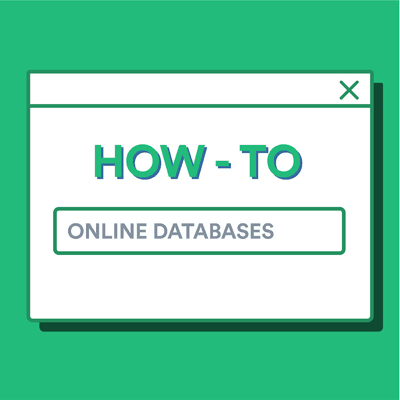
How to efficiently search online databases for academic research
Academic research isn't difficult if you know where and how to search for scholarly articles and research papers. Here's how to do it.
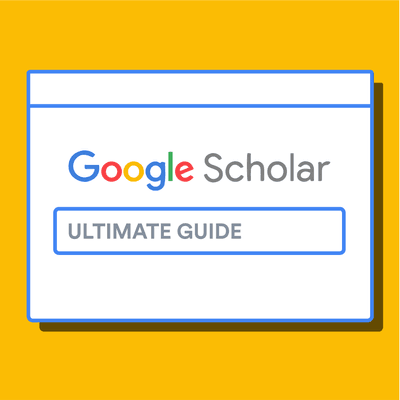
How to use Google Scholar: the ultimate guide
Google Scholar is the number one academic search engine. Our detailed guide covers best practices for basic and advanced search strategies in Google Scholar.
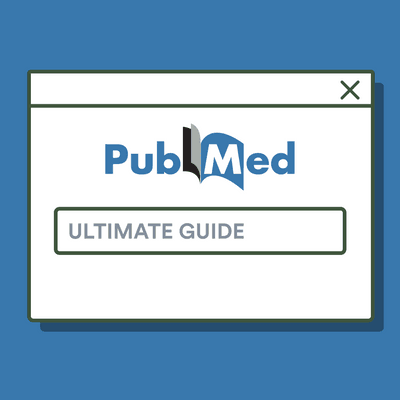
How to use PubMed: the ultimate guide
PubMed is the most popular search engine for biomedical sciences. Learn how to use PubMed, basic and advanced search strategies, and about its limitations and alternatives in this ultimate guide.
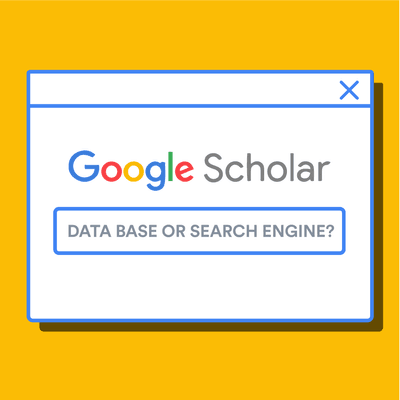
Is Google Scholar a database or search engine? [Update 2024]
Google Scholar is the number one free resource to discover scientific literature, but is it an academic database or a search engine?
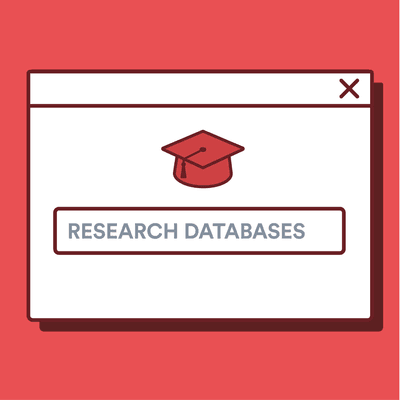

The best academic research databases [Update 2024]
Your research is stuck and you need to find new sources? Take a look at our compilation of academic research databases: Scopus, Web of Science, PubMed, ERIC, JSTOR, DOAJ, Science Direct, and IEEE Xplore.

The best academic search engines [Update 2024]
Your research is stuck, and you need to find new sources. Take a look at our compilation of free academic search engines: ✓ Google Scholar ✓ BASE ✓ CORE ✓ Science.gov
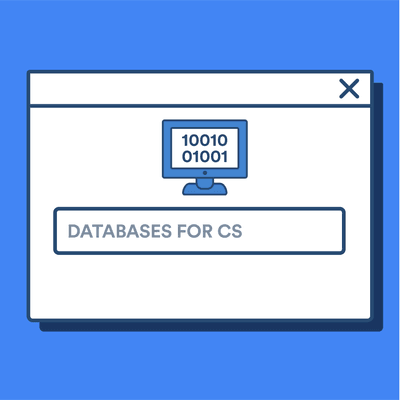
The best research databases for computer science [Update 2024]
The top 4 research databases specifically dedicated to computer science: ✓ ACM Digital Library ✓ IEEE Xplore ✓ dbpl ✓ Springer LNCS

The best research databases for healthcare and medicine [Update 2024]
We have compiled the top list of research databases for healthcare, medicine, and biomedical research: PubMed, EMBASE, PMC, and Cochrane Library.
Bibliometrics
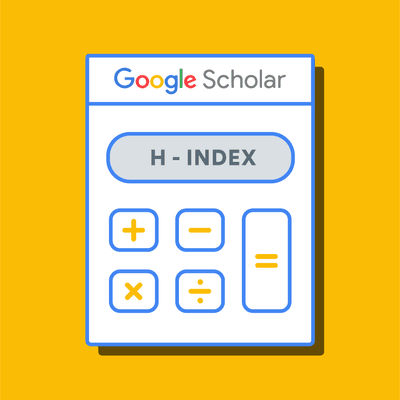
Learn how to calculate your h-index on Google Scholar
Learn how to calculate your h-index using Google Scholar online for free, and which tools to use for a detailed analysis.
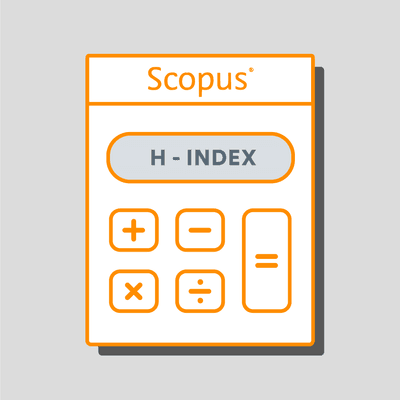
Learn how to calculate your h-index using Scopus [3 steps]
Learn how to assess your h-index on Scopus in 3 easy steps.
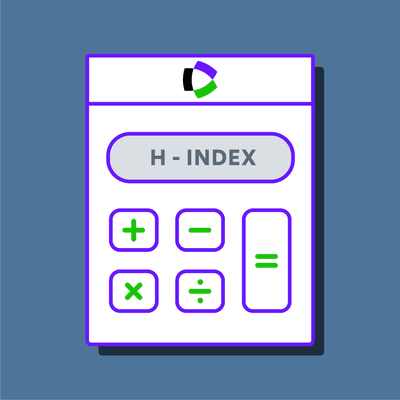
Learn how to calculate your h-index using Web of Science
Learn how to calculate your h-index using Web of Science in 3 easy steps.
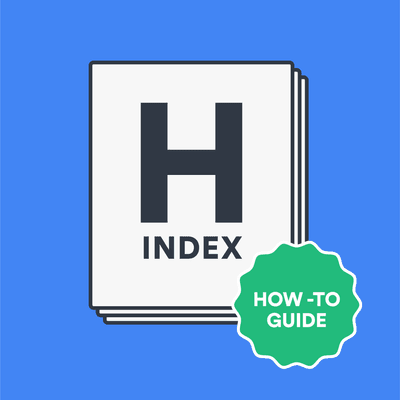
The ultimate how-to-guide on the h-index
Learn what an h-index is, how to calculate it, and why it is important to know about it for your career as a scientist.
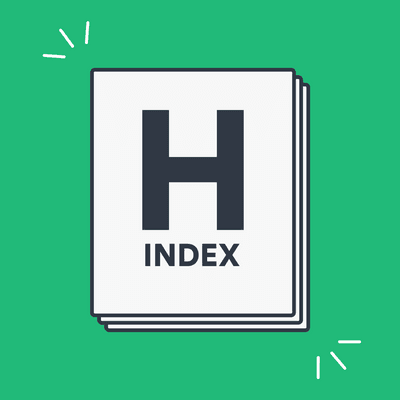
What is a good h-index? [with examples]
Curious to know what a good h-index is? Read this guide to learn when an h-index is considered good.
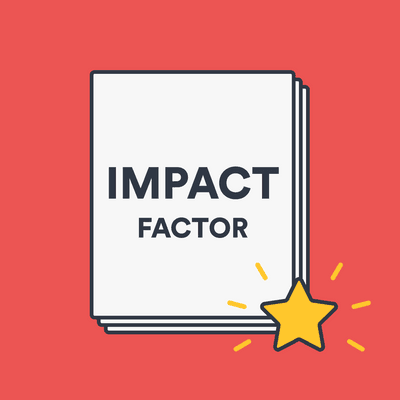
What is a good impact factor?
Do you want to find out what a good impact factor is? Read this guide to learn what an impact factor is, how it is calculated, and what impact factor is considered good.
Credible Sources

Can a blog be a credible source? [Update 2024]
You want to add a blog post to your research paper? In general, blogs are not considered to be credible sources: ➜ check out these reasons to learn more about it.

How can I find credible sources? [7 tips]
Sometimes it is hard to determine whether a source is credible or not. Read our guide to help you find credible sources.
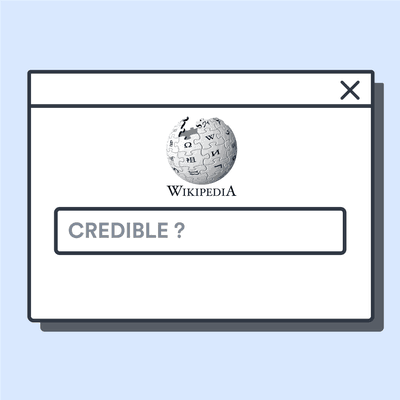
Is Wikipedia a credible source?
We all ❤ Wikipedia, but can you cite it in your research paper? No. Wikipedia is not a credible source, and here is why you should only use it for preliminary research.
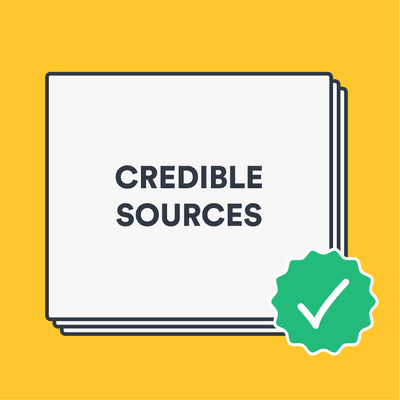
What are credible sources?
Credible sources are sources that are trustworthy and can be used as references in your academic papers. This guide will help you identify and evaluate sources for their credibility.
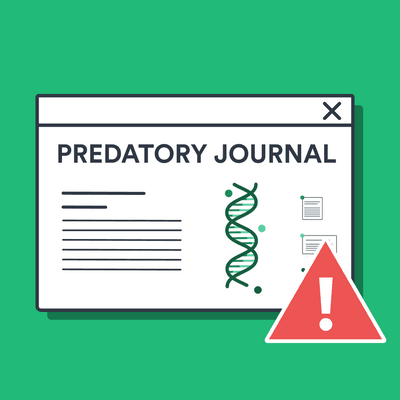
What are predatory journals?
This day and age, you have to be careful where you submit your work for publication. This article helps you spot a predatory journal and has tips and tricks on what to do if you accidentally submitted to one.
Primary and Secondary Sources

Interviews: are they a primary source?
Interviews can add tremendously to your research project. Read on to quickly learn when an interview is considered a primary source.
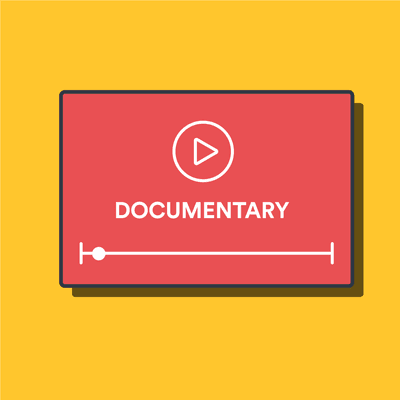
Is a documentary a secondary source? [with examples]
You are not sure if a documentary is a secondary source? We show you when and why is a documentary either a secondary or a tertiary source.

Is a letter a primary source?
Letters are frequently used in historical research. Read on to see when a letter qualifies as a primary source.
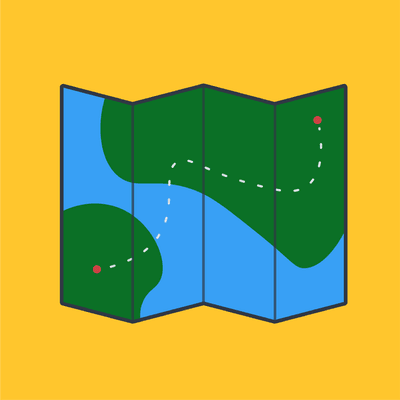
Is a map a primary source? [with examples]
Are you not sure if a map is a primary source? This guide will show you when and why a map is a primary or a secondary source.
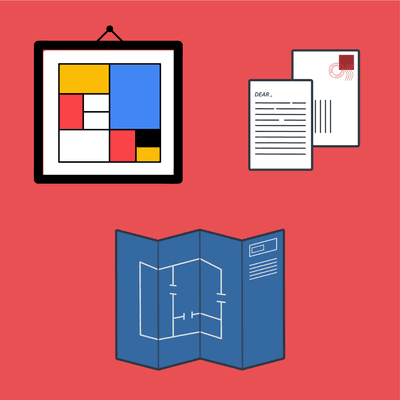
Is a painting a primary source? [with examples]
Are you unsure if a painting is a primary source? This guide will show you when and why a painting is either a primary or a secondary source.

Is a textbook a secondary source?
Are you unsure if a textbook is a secondary source? Learn in this guide when and why a textbook is either a primary, secondary, or tertiary source.

Is an autobiography a primary source?
Are you not sure if an autobiography is a primary source? We show you when and why an autobiography is either a primary or secondary source.

Is an encyclopedia a primary source?
Are you unsure if an encyclopedia is a primary source? Find your answer and learn the right way to reference an encyclopedia in this guide.
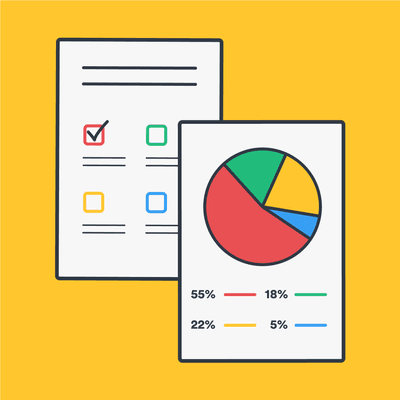
Is census data a primary source?
You are not sure if census data is a primary source? We will show you when and why census data is a primary source and where to get it.

Is the US Constitution a primary source?
Are you wondering if the US Constitution is a primary source? Find the answer to your question in this guide.

Newspaper articles: primary or secondary sources?
Learn what questions to ask to see if a newspaper article really qualifies as a primary source.
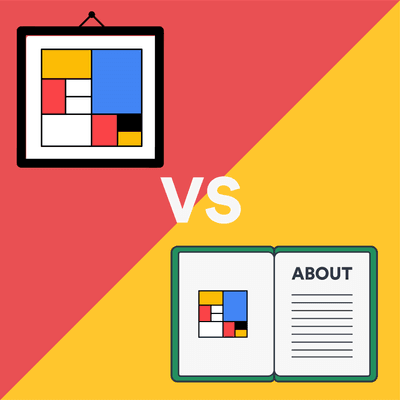
Primary vs. secondary sources: how to distinguish them
Primary and secondary sources are the foundations of every research project. Learn about their differences and when to use them.
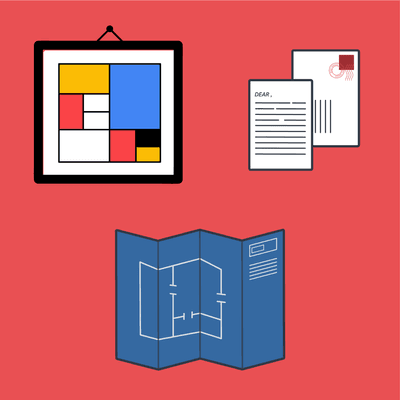
What is a primary source?
Primary sources are the most important sources when undertaking a research project. We answer the 5 most asked questions about primary sources.
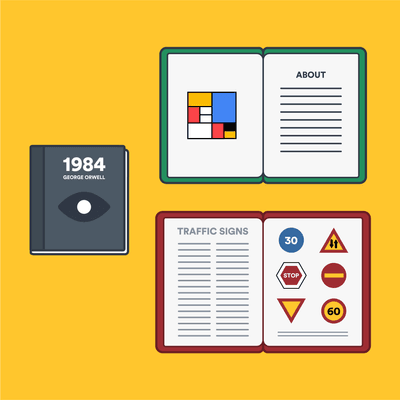
What is a secondary source?
Secondary sources are your starting point when undertaking a research project. We answer the 5 most asked questions about secondary sources.
Research Methodology
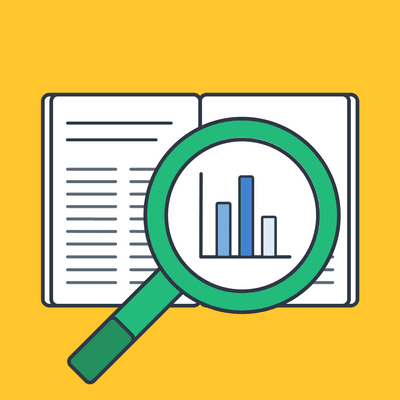
How to do a content analysis [7 steps]
Content analysis is a research method you might come across when analyzing data. Learn what a content analysis is and how to do one in this step-by-step guide.
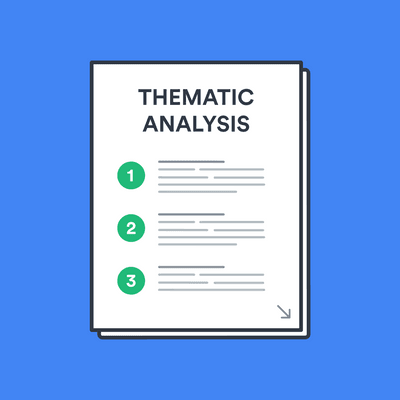
How to do a thematic analysis [6 steps]
A thematic analysis is a research method you might come across when analyzing qualitative data. Learn what a thematic analysis is and how to write one in this step-by-step guide.
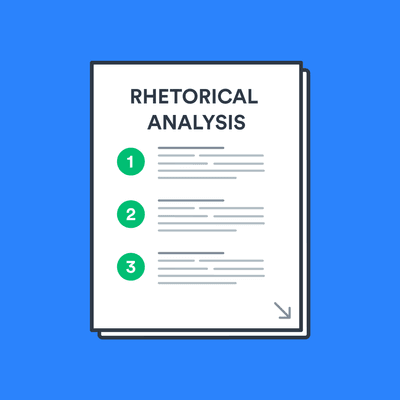
How to write a rhetorical analysis [4 steps]
A rhetorical analysis explores the goals and motivations of an author, the techniques they’ve used to reach their audience, and how successful these techniques were. Learn how to write an excellent rhetorical analysis in this guide.
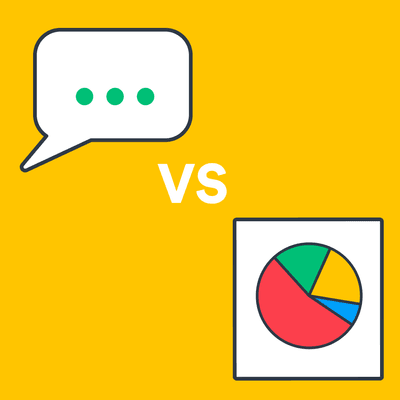
Qualitative vs. quantitative research - what’s the difference?
Qualitative and quantitative research are effective but very different approaches to study a subject. Learn the difference between them, what they are used for, and how to analyze qualitative and quantitative research in this guide.
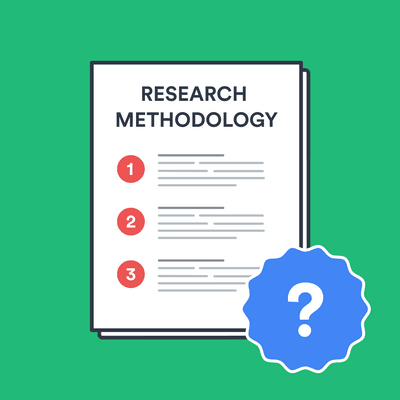
What is research methodology? [Update 2024]
Having the right research methodology can be a make-or-break factor for your academic work. What is research methodology, and how can you get ahead?
Scholarly Sources
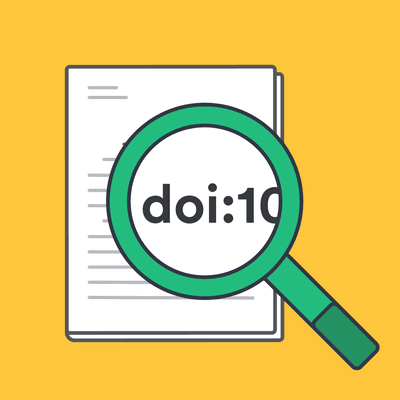
How to find a DOI [Update 2024]
Are you not sure where to find a DOI? Read this guide to learn exactly where to spot DOIs, and how to include them in your citations!

How to identify if a source is scholarly
Not sure if it is a scholarly source? Looking at these 6 identifiers can help differentiate scholarly from non-scholarly articles.

How to know if an article is peer reviewed [6 key features]
You don't know exactly what 'peer reviewed' articles are? Read this guide to learn all about peer reviewed articles, their features, and how to find them!

Is a book a scholarly source? [with checklist]
Sometimes it can be difficult to distinguish scholarly from non-scholarly books. This guide will help you with that. Learn how to identify scholarly books by following our simple guidelines.
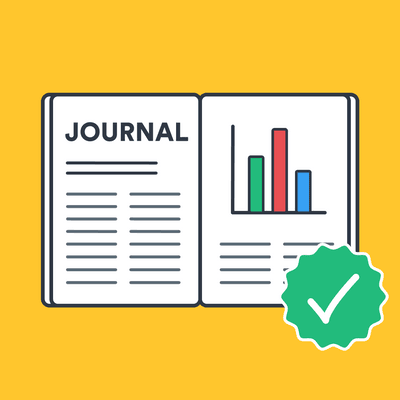
What are peer reviewed journals? [Update 2024]
You don't know exactly what 'peer review' means? Read this guide to clear your doubts, and learn more about peer reviewed articles, its process and types!

What is a DOI [with examples]
What is a DOI? Learn what a digital object identifier is and how to include a DOI in APA and other styles.

What is a scholarly source?
Are you wondering what a scholarly source is and what makes it a scholarly source? Learn all about it in this guide, including what elements a scholarly source generally contains.

What is grey literature? [with examples]
Wondering what is grey literature and how to find it? Find all things grey literature in this quick and easy guide filled with sources for grey literature.

Google Scholar
- Google Scholar Basics
Advanced Scholar Search
Accessing the advanced scholar search menu, advanced search features.
- Results Page
Much of the time, a simple keyword search will help you find what you need. However, there are times when you may want to have more control over what your search does. You may want to control the publication date, search for results by a particular author or in a particular journal, give synonyms, or remove unwanted results. When you need to do this, the Advanced Scholar Search menu can help.

- In the upper left corner of the page, press the button made of three horizontal lines to open a new menu.
- Advanced Search should be the second to last option in the newly-opened menu.
The Advanced Scholar Search menu has eight ways of searching, organized into three broad sections. You are able to mix and match these different search options together.

All / Exact Phrase / At Least One / Without
Helps you control the search words you are searching with.
- Words typed into the first search bar must all be included in your result. This is how a regular Google Scholar search works.
- You can also do this in the regular search bar by putting the words in quotes. Ex. "myocardial infarction"
- You can also do this in the regular search bar by putting "OR" in between your search words. Ex. Missouri politics OR government
- You can also do this in the regular search bar by putting a minus sign (-) before a word. Ex. Shakespeare -tragedies
Where My Words Occur
Controls where Google Scholar will look for your search words.
- Selecting "anywhere in the article" will likely turn up a larger number of results, because the search engine can look for your keywords in more places. This is the Google Scholar default.
- Selecting "in the title of the article" may help improve the relevance of your results, because if your keyword is in the title, it is likely more important to what the article is about.
Authored by/Published in/ Dated Between
- You can also do this in the regular search bar by putting "author:" before the author's name. Ex. intersectionality author:Crenshaw
- The second search bar lets you search for results in a particular scholarly journal . Google Scholar understands many common ways of abbreviating journal titles.
- You can also adjust this from the results page .
- << Previous: Google Scholar Basics
- Next: Results Page >>
- Last Updated: Jan 11, 2023 11:21 AM
- URL: https://semo.libguides.com/google-scholar

Explore millions of high-quality primary sources and images from around the world, including artworks, maps, photographs, and more.
Explore migration issues through a variety of media types
- Part of The Streets are Talking: Public Forms of Creative Expression from Around the World
- Part of The Journal of Economic Perspectives, Vol. 34, No. 1 (Winter 2020)
- Part of Cato Institute (Aug. 3, 2021)
- Part of University of California Press
- Part of Open: Smithsonian National Museum of African American History & Culture
- Part of Indiana Journal of Global Legal Studies, Vol. 19, No. 1 (Winter 2012)
- Part of R Street Institute (Nov. 1, 2020)
- Part of Leuven University Press
- Part of UN Secretary-General Papers: Ban Ki-moon (2007-2016)
- Part of Perspectives on Terrorism, Vol. 12, No. 4 (August 2018)
- Part of Leveraging Lives: Serbia and Illegal Tunisian Migration to Europe, Carnegie Endowment for International Peace (Mar. 1, 2023)
- Part of UCL Press
Harness the power of visual materials—explore more than 3 million images now on JSTOR.
Enhance your scholarly research with underground newspapers, magazines, and journals.
Explore collections in the arts, sciences, and literature from the world’s leading museums, archives, and scholars.
An official website of the United States government
The .gov means it’s official. Federal government websites often end in .gov or .mil. Before sharing sensitive information, make sure you’re on a federal government site.
The site is secure. The https:// ensures that you are connecting to the official website and that any information you provide is encrypted and transmitted securely.
- Publications
- Account settings
Preview improvements coming to the PMC website in October 2024. Learn More or Try it out now .
- Advanced Search
- Journal List
- Int J High Risk Behav Addict
- v.1(4); Winter 2013

Comparison of Four Search Engines and their efficacy With Emphasis on Literature Research in Addiction (Prevention and Treatment)
Gholam reza samadzadeh.
1 Department of Library and Medical Information Sciences, Zahedan University of Medical Sciences and Health Services, Zahedan, IR Iran
Tahereh Rigi
2 Department of Library and Information Sciences, Zahedan Payame Noor University, Zahedan, IR Iran
Ali Reza Ganjali
3 Research Center of Children and Adolscents Health, Health Services, Zahedan University of Medical Sciences, Zahedan, IR Iran
Surveying valuable and most recent information from internet, has become vital for researchers and scholars, because every day, thousands and perhaps millions of scientific works are brought out as digital resources which represented by internet and researchers can’t ignore this great resource to find related documents for their literature search, which may not be found in any library. With regard to variety of documents presented on the internet, search engines are one of the most effective search tools for finding information.
The aim of this study is to evaluate the three criteria, recall, preciseness and importance of the four search engines which are PubMed, Science Direct, Google Scholar and federated search of Iranian National Medical Digital Library in addiction (prevention and treatment) to select the most effective search engine for offering the best literature research.
Materials and Methods
This research was a cross-sectional study by which four popular search engines in medical sciences were evaluated. To select keywords, medical subject heading (Mesh) was used. We entered given keywords in the search engines and after searching, 10 first entries were evaluated. Direct observation was used as a mean for data collection and they were analyzed by descriptive statistics (number, percent number and mean) and inferential statistics, One way analysis of variance (ANOVA) and post hoc Tukey in Spss. 15 statistical software. P Value < 0.05 was considered statistically significant.
Results have shown that the search engines had different operations with regard to the evaluated criteria. Since P Value was 0.004 < 0.05 for preciseness and was 0.002 < 0.05 for importance, it shows significant difference among search engines. PubMed, Science Direct and Google Scholar were the best in recall, preciseness and importance respectively.
Conclusions
As literature research is one of the most important stages of research, it's better for researchers, especially Substance-Related Disorders scholars to use different search engines with the best recall, preciseness and importance in that subject field to reach desirable results while searching and they don’t depend on just one search engine.
1. Background
Surveying the valuable and the most recent information has become vital for researchers and scholars, because every day, thousands and perhaps millions scientific works are bought out as digital resources that represented by internet and researchers can’t ignore this great resource for literature review and they find related documents for their literature searche that may not be found in any library ( 1 ). Developing new technologies, scholars have faced abundant variety of collection literature research review with regard to subject of presentation and information space. Web cyberspace attracts the researchers’ attention because of variety of data with different forms and simultaneity. Literature search review is one of the most important search stages. Revising the literature search detected by search station in the broader tissue off helps researcher to expand the research view and his/her landscape. On the other hand he/she limits the research title and reaches to an intensive research question ( 2 ). Web, a huge resource of data plays an important role as an information reference for scholars. Nowadays, the rate of network data growth caused inaccessibility of information that is more worse than lacking them ( 3 ). With the creation and development of internet network as the greatest, the most varied and the most widespread information resource, simultaneous and various types of search tools are appeared to help users find information they want, these tools include search engines, meta-search engines and subject directories ( 4 ). Information retrieval is a challenge for users since search tools are too complex to navigate ( 5 ). As one of the most effective searching tools, its role is distinct because those search engines use software facilities which can find information from different sites for users. On the other hand, during the past decades developed knowledge in Substance-Related Disorders caught everyone’s eyes enormously ( 6 ). This growth is as a result of discussing about addiction as a national, regional and multi-dimensional problem. The volume of produced information and up to date personal data necessitates to study hours in a day, even a small part of this subject. Therefore, persuading to use internet is essential for updating data literature review. Then we concluded that the mentioned four popular search engines in medical sciences include: PubMed, Science Direct, Google Scholar and federated search of Iran’s health, treatment and medical education ministry and indicated that whether the of above mention search engines offered the best literature search about addiction (prevention and treatment). In Tober’s study, the four most popular search engines; PubMed, Science Direct, Scopus and Google Scholar are investigated to evaluate which search engine is the most effective for literature research in laser medicine. He concludes that all in all, Scopus was the most effective search engine in the literature research ,in case of requiring only an overview of the topic, even for a widespread and in depth investigation in area of life sciences and closely related topics, PubMed was more appropriate. Google Scholar, Science Direct are the best in preciseness and importance criterion in laser medicine ( 7 ). Also Bajpaie and et investigated in a research and compared 18 search tools, their results showed that four tools could be better than the others; these tools include two of the full-text scanners (High wire press & Google Scholar) and two citation scanners (PubMed & Scopus). The results show that, use of a single search tool can lead to loss of up to 70 % of the relevant citations in some cases. Hence, use of multiple search tools is recommended ( 8 ). Anders & Ivans compared PubMed with Google Scholar literature search in respiratory care topics by cross-sectional study and their research results showed that PubMed and Google Scholar had similar recall, but at precision criterion PubMed was better than the other. According to researches, PubMed was more efficient and better than Google Scholar with regard to the patient's searches and educational purposes ( 9 ).
In research by Flagas et al. a Comparison was made to evaluate the strength and weaknesses of PubMed, Scopus, Web of Science, and Google Scholar. Results showed that all databases were practical and offered numerous search facilities. PubMed and Google Scholar were free access for users. PubMed had offered optimal update frequency and include recent online articles; other database had rated articles based on some criteria such importance. For citation analysis, Scopus offered about 20% more coverage than Web of science; and Scopus covers the wider range of journals. Google Scholar can help in the retrieval of even the most oblique information and less often update ( 10 ). In a descriptive research, Mohammad Esmaeil, Lafzghazi and Gilvari compared six search engines and six meta-search engines in pharmaceutics information retrieval, results showed that if users survey in several search engines, they access to the relevant documents among the vastly available sources on web. Their research showed that Yahoo retrieved the most pharmaceutics documents and AOL had 62% precision and 21% recall, it retrieved the most relevant pharmaceutics documents. Among meta-search engines Dogpile was better than others ( 4 ). Outline description from evaluated search engines is explained in in the following:
1.1. PubMed
In 1997, PubMed (http://www.ncbi.nlm.nih.gov/PubMed) was offered by the National Library of Medicine on internet. It is one of the most popular and the most responsible resources on the World Wide Web for physicians and scholars ( 10 ). PubMed is a free search engine to search about medicine and biomedical journal literature. It searches several databases and interfaces Medline, directly. This search engine maps user’s search terms to the Medical subject heading (Mesh) and text words in Medline records and then searching ( 9 ). The PubMed offers users numerous powerful searche filters to limit their searches and gives them desirable retrieval information ( 11 ).
1.2. Science Direct
Science Direct (http://www.science direct.com) is a full text scientific database which is a part of the science verse and is provided by Elsevier publication in 1997. The web portal of Science Direct opens with features which invites the users just to browse the word scientific publications ( 7 ). This search engine is one of the greatest bibliographic and full text electronic collections about science, technology and medicine. Also we can have an exact searching with regard to limitations and abilities that is offered by Science Direct ( 12 ).
1.3. Google Scholar
Google Scholar (http://scholar.google.com): it’s design and handling is similar to that of Google search engine. It provides a simple way to search broadly for scholarly literature. In a particular place you can search across many disciplines and sources such as articles, theses, books, abstract and etc. This search engine helps you to find relevant scientific works in all over the world of sceince ( 12 ). The search results in Google Scholar can be limited to title, author, publication source, publishing date and other filters ( 13 ).
1.4. Integrated Digital Library (IDL):
IDL is an advanced system which gives us simple and one step access to all electronic resources at the Iranian National Medical Digital Library. Also we can browse and search all databases, e-journals, e-books and references in digital library alphabetically or by subject. Federated search allows you to search multiple online databases. Federated search saves your time and provides your favorite results quickly ( 14 ).
2. Objectives
The aim of this study is to evaluate the three criteria such as recall, precision and importance in the four search engines: PubMed, Science Direct, Google Scholar and federated search of Iranian National Medical Digital Library in addiction (prevention and treatment) to select the most effective search engine for offering the best literature research.
3. Materials and Methods
This research was cross-sectional study and we evaluated four famous and popular search engines in medical sciences include: PubMed, Science Direct, Google Scholar and federated search in IDL. We limited search to “Substance-related disorders” keyword in all search engines because this was the most common key word that specialists used. Documents that search engines offer are listed as results according to relevant value of query search with descent sequence. Hence, document offered as the first record in the search results, is the most related document to query search, from vision of that search engine ( 3 ). With regard to what was mentioned above and what cited to Tober’s study, sample research selected 10 first results of retrieval documents of each search engines. To compare search engines, three criteria, recall, precision and importance were evaluated ( 7 ). The calculation method for each criterion is explained as follow:
3.1. Performance test: Criteria of evaluation
The aim of the performance test was to get an overview about article dealing with the addiction topic (prevention and treatment). Therefore, we consulted with psychiatrist and selected proper key word among prevalent terms, and then matched with web version of mesh ( 15 ), and “Substance-Related Disorders” keyword was chosen as the most relevant query search at search engines in addiction (prevention and treatment).
1. The criterion ‘‘recall’’ (or ‘‘hits’’) is the number of found articles and is related to the integrity of the evidence base.
2. The criterion ‘‘precision’’ determines how well the filtered articles cover the topic of the search term and influences the time and cost of screening and the results for the related articles. It is evaluated by counting the search term in the search fields ‘‘title’’ (n title) and ‘‘abstract’’ (n abstract). The appearance of the terms in the field ‘‘title’’ (a) is two times more than the field ‘‘abstract’’ (b). Additionally the appearance is rated by the rank i, the position of the filtered article in the results list. From this the precision P can be calculated as follows:
P = ( (n + 1) – i ) • (a × n title + b × n abstract)
3. The criterion ‘‘importance’’ is determined by the number of citations “n” citation by publications of other authors. For this articles, citations that were in Science Direct and Google Scholar had been considered and for articles, citations were offered by PubMed and IDL and the other articles without citation, Web of knowledge citation database was used. Number of citation was used for calculating importance criterion and the rank i as described before. From this, the importance I is calculated as follows:
I = ((n + 1) − i) • n citation
For this study, only English written abstract and title which contain the search term “Substance-Related Disorders” were analyzed, for collecting information and data, directly observation was used. We entered keyword in each search engine, and to evaluate criteria, number of all retrieval articles (hits), titles, abstracts, and citations of 10 first articles in the result list were considered. All searches were conducted on November 29th, 2011 on Windows seven environment with Microsoft Internet Explorer in the Central Library of Zahedan Medical Sciences University. We used statistical software Spss 15 for data analysis. One-way analysis of variance (ANOVA) and post hoc Tukey was performed to evaluate search engines. P < 0.05 was considered statistically significant.
Results showed that PubMed retrieved most of the documents, 213 articles (32%) and it was better than the other search engines on recall criterion. Results from recall criterion were similar in Science Direct with 188 hits (28%) and, Google Scholar with 184 hits (27%). And IDL with 91 hits (13%) offered the least articles in this subject ( Table 1 ).
After survey of titles and abstract precision and statistical indicators of each search engines were investigated. Investigation of means showed that “the most precision” has allocated to Science Direct search engine with mean 25.2 (33%) and after that was ILD with mean 17.9 (24%), and then were PubMed with mean 16.2 (22%) and Google Scholar with mean 16 (21%). For detecting precision among search engines, One-way analysis of variance (ANOVA) was used and P value earned (0.726) which was more than 0.05, and this explained there was not statistically significant difference among search engines for precision. Whereas assessed P value from article titles investigation was P = 0.004 which showed significant difference in precision among search engines. Post hoc Tukey showed that there was difference between Science Direct with PubMed ( Table 2 ).
For importance, results showed that Google Scholar was the best and its means was 510.3 (82%), and after that was Science Direct, with mean 115.6 (18%). IDL with mean 0.3 (0%) and PubMed were not scored. Results of One-way analysis of variance (ANOVA) showed P Value = 0.002 that was less than 0.05, so we used Post hoc Tukey. Finding from importance criterion showed statistically significant difference between Google Scholar with each of the others search engines ( Table 3 ).
5. Discussion
Literature search is one of the most important steps in the research process. We review literature to avoid heavy works, to ensure we have a thorough understanding of the topic, to identify similar work done within the area, to identify knowledge gaps that demand further investigation, to compare previous findings, to critique existing finding and suggest further studies ( 16 ), which this features increase the importance or the exact literature review. Review of literature accomplishes for literature search in medical sciences on the internet by different search engines that they were compared, evaluated and reviewed by the other researchers in different countries to identify their search’s features and abilities ( 5 - 10 ) ( 15 - 22 ). This research was done to select the most effective search engine for offering the best literature research in addiction (prevention and treatment).
Investigations showed that search engines in various subject fields with regard to unique abilities and facilities are done differently, which this affair supported by other researchers, too ( 16 , 18 ). Search engines cover just a limited part of accessible information on the web and neither of them don’t have total recall and precision. The scale of recall, precision ( 23 ), and importance of search engines are different with regard to purpose of researchers from search. Results of this study showed that evaluated criteria were different in search engines, whereas PubMed had the most recall criterion and then were Science Direct and Google Scholar with similar recall. Recall in PubMed was about two times more than ILD’s recall. The results of Tober study were different, whereas PubMed had least recall in laser medicine ( 7 ). At the other research was done in respiratory care, results showed that the function of two search engines (PubMed & Google Scholar) was similar in recall criterion ( 9 ), our study showed this similarity between Google Scholar and Science Direct.
Means investigation explained that Science Direct offered the best precision and related documents in addiction. Although Results of One - way analysis of variance (ANOVA) did not show significant difference in precision among search engines, results were different in investigation of retrieved articles titles which P - value was less than 0.05 that explanatory existence showed significant difference among search engines, post hoc Tukey showed that considerable difference exists between Science Direct and PubMed. Also, in Tober study, Science Direct after Scopus had the best precision 7. But in the other research, results were different whereas PubMed had above precession ( 9 ).
In this study, Google Scholar had maximum importance and the next was Science Direct. PubMed and IDL were not scored. In PubMed Tober’s study, results were similar to our study in this criterion. For importance, results of ANOVA showed significant difference, moreover post hoc Tukey and comparing means showed that the difference was remarkable among Google Scholar. Also, former researcher supported indication of Google Scholar for offering the citations which caused importance of articles ( 10 , 20 , 22 ). Reviews of this research showed that IDL did not offer acceptable results in any of three criteria, with regard to expensive cost that Iran’s health, treatment and medical education ministry pay for funding medical sciences universities and this will be revision to buy and use this database or be changed the operation of federated search.
We had local limitation for our searches in federated search of IDL and Science direct because this search engines were not available to the public. The other limitation to our study was that we only used the “Substance- related disorders” keyword in search engines and didn’t use the related keywords. Next limitation was that at first, we wanted to evaluate Scopus along with the other search engines, but Scopus was disconnecting in Iran and thus excluded from this study. Results showed that use of one search engine for literature review in addiction (prevention and treatment), neither proper nor search engines can’t give us the best results. Former studies, also recommended combined search and simultaneous use from several search engines to reach effective and related results ( 4 , 8 , 17 ). With regard to broad extent, multilateral addiction subject and new sights discussion, it is recommended that researchers must use different search engines with the best recall, precision and importance to reach the best results, they must continue their search with abilities and various services that search engines give.
Acknowledgments
We appreciate Mr. Dashipoor for statistical analysis.
Implication for health policy/practice/research/medical education:
The aim of this study is the evaluation of three criteria, recall, precision and importance in the four search engines: PubMed, Science Direct, Google Scholar and federated search of Iranian National Medical Digital Library in addiction (prevention and treatment) to select the most effective search engine for offering the best literature research.
Please cite this paper as:
Samadzadeh GR, Rigi T, Ganjali AR. Comparison of Four Search Engines and their efficacy With Emphasis on Literature Research in Addiction (Prevention and Treatment). Int J High Risk Behav Addict.2013; 1(4): 166-71. DOI: 10.5812/ijhrba.6551
Authors’ Contribution:
Reza Samadzadeh conceived of and designed the study. Tahereh Rigi analyzed and interpreted the data. Alireza Ganjali drafted the paper critically revised it for important intellectual content. All authors gave final approval of the version to be publish.
Financial Disclosure:
Who have no relevant financial interests are asked to provide a statement indicating that they have no financial interests related to the material in the manuscript.
Funding/Support:
This study was no supported by Health or teaching and research Institutes.
The Anatomy of a Large-Scale Hypertextual Web Search Engine
Research areas.
Information Retrieval and the Web
Meet the teams driving innovation
Our teams advance the state of the art through research, systems engineering, and collaboration across Google.

Thank you for visiting nature.com. You are using a browser version with limited support for CSS. To obtain the best experience, we recommend you use a more up to date browser (or turn off compatibility mode in Internet Explorer). In the meantime, to ensure continued support, we are displaying the site without styles and JavaScript.
- View all journals
- Explore content
- About the journal
- Publish with us
- Sign up for alerts
- NEWS AND VIEWS
- 05 June 2024
Meta’s AI translation model embraces overlooked languages
- David I. Adelani 0
David I. Adelani is in the Department of Computer Science, University College London Centre for Artificial intelligence, London WC1V 6BH, UK; in the School of Computer Science, McGill University, Montreal, Quebec, Canada, and at Mila — Quebec AI Institute, Montreal, Quebec, Canada.
You can also search for this author in PubMed Google Scholar
Machine-translation models use artificial intelligence (AI) to translate one human language into another — a worthy feat, given the potential for enhanced communication to break down the barriers posed by differences in language and culture. Yet most of these models can interpret only a small fraction of the world’s languages, in part because training them requires online data that don’t exist for many languages. The US technology company Meta has designed a project called No Language Left Behind (NLLB) to change that. Writing in Nature , the NLLB team 1 presents a publicly available model that can translate between 204 languages, many of which are used in low- and middle-income countries.
Access options
Access Nature and 54 other Nature Portfolio journals
Get Nature+, our best-value online-access subscription
24,99 € / 30 days
cancel any time
Subscribe to this journal
Receive 51 print issues and online access
185,98 € per year
only 3,65 € per issue
Rent or buy this article
Prices vary by article type
Prices may be subject to local taxes which are calculated during checkout
doi: https://doi.org/10.1038/d41586-024-00964-2
NLLB Team. Nature https://doi.org/10.1038/s41586-024-07335-x (2024).
Article Google Scholar
Bahdanau, D., Cho, K. & Bengio, Y. Preprint at arXiv https://doi.org/10.48550/arXiv.1409.0473 (2014).
Sennrich, R., Haddow, B. & Birch, A. Proc. 54th Annu. Meet. Assoc. Comput. Linguist. (Vol. 1: Long Papers), 1715–1725 (2016).
Vaswani, A. et al. Adv. Neural Inf. Process. Syst. 30 , 6000–6010 (2017).
Google Scholar
Conneau, A. et al. Proc. 58th Annu. Meet. Assoc. Comput. Linguist . 8440–8451 (2020).
Goyal, N. et al. Trans. Assoc. Comput. Linguist. 10 , 522–538 (2022).
Adelani, D. I. et al. Preprint at arXiv https://doi.org/10.48550/arXiv.2309.07445 (2024).
Robinson, N., Ogayo, P., Mortensen, D. R. & Neubig, G. Proc. Eighth Conf. Mach. Transl. 392–418 (2023).
Bandarkar, L. et al. Preprint at arXiv https://doi.org/10.48550/arXiv.2308.16884 (2023).
Adelani, D. et al. Proc. 2022 Conf. North Am. Chapter Assoc. Comput. Linguist. Hum. Lang. Technol . 3053–3070 (2022).
Maillard, J. et al. Proc. 61st Annu. Meet. Assoc. Comput. Linguist . (Vol. 1: Long Papers) 2740–2756 (2023).
Reid, M. et al. Preprint at arXiv https://doi.org/10.48550/arXiv.2403.05530 (2024).
Zhang, K. et al. Preprint at arXiv https://doi.org/10.48550/arXiv.2402.18025 (2024).
Download references
Reprints and permissions
Competing Interests
The author declares no competing interests.
Related Articles

See all News & Views
- Machine learning
- Computer science

Need a policy for using ChatGPT in the classroom? Try asking students
Career Column 05 JUN 24

Meta’s AI system is a boost to endangered languages — as long as humans aren’t forgotten
Editorial 05 JUN 24

Superfast Microsoft AI is first to predict air pollution for the whole world
News 04 JUN 24

Scaling neural machine translation to 200 languages
Article 05 JUN 24

Accelerating AI: the cutting-edge chips powering the computing revolution
News Feature 04 JUN 24

Who owns your voice? Scarlett Johansson OpenAI complaint raises questions
News Explainer 29 MAY 24
Faculty Positions in School of Engineering, Westlake University
The School of Engineering (SOE) at Westlake University is seeking to fill multiple tenured or tenure-track faculty positions in all ranks.
Hangzhou, Zhejiang, China
Westlake University
High-Level Talents at the First Affiliated Hospital of Nanchang University
For clinical medicine and basic medicine; basic research of emerging inter-disciplines and medical big data.
Nanchang, Jiangxi, China
The First Affiliated Hospital of Nanchang University
Professor/Associate Professor/Assistant Professor/Senior Lecturer/Lecturer
The School of Science and Engineering (SSE) at The Chinese University of Hong Kong, Shenzhen (CUHK-Shenzhen) sincerely invites applications for mul...
Shenzhen, China
The Chinese University of Hong Kong, Shenzhen (CUHK Shenzhen)
Faculty Positions& Postdoctoral Research Fellow, School of Optical and Electronic Information, HUST
Job Opportunities: Leading talents, young talents, overseas outstanding young scholars, postdoctoral researchers.
Wuhan, Hubei, China
School of Optical and Electronic Information, Huazhong University of Science and Technology
Sign up for the Nature Briefing newsletter — what matters in science, free to your inbox daily.
Quick links
- Explore articles by subject
- Guide to authors
- Editorial policies

IMAGES
VIDEO
COMMENTS
Google Scholar provides a simple way to broadly search for scholarly literature. Search across a wide variety of disciplines and sources: articles, theses, books, abstracts and court opinions.
Get 30 days free. 1. Google Scholar. Google Scholar is the clear number one when it comes to academic search engines. It's the power of Google searches applied to research papers and patents. It not only lets you find research papers for all academic disciplines for free but also often provides links to full-text PDF files.
15 Best Academic Journal Discovery Platforms. 15 Best Academic Research Trend Prediction Platforms. 15 Best Websites To Download Research Papers For Free. #20. Jurn. Powered by Google Custom Search Engine (CSE), Jurn is a free online search engine for accessing and downloading free full-text scholarly papers.
Google Scholar is a freely accessible web search engine that indexes the full text or metadata of scholarly literature across an array of publishing formats and disciplines. Released in beta in November 2004, the Google Scholar index includes peer-reviewed online academic journals and books, conference papers, theses and dissertations, preprints, abstracts, technical reports, and other ...
Google Scholar provides a simple way to broadly search for scholarly literature. From one place, you can search across many disciplines and sources: articles, theses, books, abstracts and court ...
Google Scholar searches are not case sensitive. 2. Use keywords instead of full sentences. 3. Use quotes to search for an exact match. 3. Add the year to the search phrase to get articles published in a particular year. 4. Use the side bar controls to adjust your search result.
Please show you're not a robot ...
Google Scholar is also one of Google's longest-running services. The comprehensive database of research papers, legal cases and other scholarly publications was the fourth Search service Google launched, Anurag says. In honor of this very important tool's 18th anniversary, I asked Anurag to share 18 things you can do in Google Scholar that ...
Since 2004, Google Scholar has offered a new, free web-based academic paper search engine to the online community, while connecting readers and scholars without the limitations of time or distance. Research indicates that Google Scholar must continue to improve its indexing and ranking of academic papers (Harzing, 2016; Mayr & Walter, 2007 ...
Like Google, Google Scholar allows searching of metadata terms, but unlike Google, it also indexes full text. Choose the default search or select "Advanced search" to search by title, author, journal, and date. For more advanced researchers, it is possible to specify phrases in quotation marks, enter Boolean queries, or search within fields.
Science.gov: Free search engine for scientific research from US government agencies. Semantic Scholar: Uses AI to find relevant research papers and uncover hidden connections. Baidu Scholar: Search engine for academic literature in Chinese . Top 10 Best Search Engines to Search for Scientific Papers
This article contains a representative list of notable databases and search engines useful in an academic setting for finding and ... the independent estimates released as journal papers should be. Notably, Google Scholar does not offer such detail, but the database's size has been calculated. ... Research Papers in Economics: Economics: 90,000 ...
The best academic search engines [Update 2024] Your research is stuck, and you need to find new sources. Take a look at our compilation of free academic search engines: Google Scholar BASE CORE Science.gov
Accessing the Advanced Scholar Search Menu. To pull up the Advanced Scholar Search menu, go to the regular Google Scholar search page. In the upper left corner of the page, press the button made of three horizontal lines to open a new menu. Advanced Search should be the second to last option in the newly-opened menu.
Find the research you need | With 160+ million publications, 1+ million questions, and 25+ million researchers, this is where everyone can access science
You can explore all of them here. 2. Google Scholar. Google Scholar. Google Scholar is undoubtedly one of the popular search engines. With its vast database of scholarly literature, Google Scholar allows users to search for articles, theses, books, and conference papers across multiple academic disciplines.
Publications. Our teams aspire to make discoveries that impact everyone, and core to our approach is sharing our research and tools to fuel progress in the field. Google publishes hundreds of research papers each year. Publishing our work enables us to collaborate and share ideas with, as well as learn from, the broader scientific community.
Harness the power of visual materials—explore more than 3 million images now on JSTOR. Enhance your scholarly research with underground newspapers, magazines, and journals. Explore collections in the arts, sciences, and literature from the world's leading museums, archives, and scholars.
The aim of this study is the evaluation of three criteria, recall, precision and importance in the four search engines: PubMed, Science Direct, Google Scholar and federated search of Iranian National Medical Digital Library in addiction (prevention and treatment) to select the most effective search engine for offering the best literature research.
The Anatomy of a Large-Scale Hypertextual Web Search Engine. Sergey Brin and Lawrence Page Computer Science Department, Stanford University, Stanford, CA 94305, USA [email protected] and [email protected] Abstract In this paper, we present Google, a prototype of a large-scale search engine which makes heavy use of the structure present ...
In this paper, we present Google, a prototype of a large-scale search engine which makes heavy use of the structure present in hypertext. Google is designed to crawl and index the Web efficiently and produce much more satisfying search results than existing systems. The prototype with a full text and hyperlink database of at least 24 million ...
Semantic Scholar's Logo A free, AI-powered research tool for scientific literature. Search 218,872,706 papers from all fields of science. Search. Try: Carl H June; Renaissance; Ontology Learning; New & Improved API for Developers. Our API now includes paper search, better documentation, and increased stability. Join hundreds of other developers ...
Author. 1. Author search is one of the most effective ways to find a specific paper. If you know who wrote the paper you're looking for, you can simply add their last name to your search terms. The search [ friedman regression] returns papers on the subject of regression written by people named Friedman. If you want to search on an author's ...
Nele Dresen is a Junior Research Fellow at the University of Tartu's School of Theology and Religious Studies. She holds degrees in History (BA) and Religious Studies (MA). In 2023, Nele Dresen served as a visiting researcher at the University of Helsinki, where she continued her research in religious change and discourse analysis, with funding from the Kristjan Jaak Scholarship.
Search 218,898,538 papers from all fields of science. Search. Sign In Create Free Account. ... Indonesia from 2013-2021 Using Landsat-8 Imagery and Google Earth Engine. ... Semantic Scholar is a free, AI-powered research tool for scientific literature, based at the Allen Institute for AI. Learn More.
There are alternatives to Google's search engine, including specialty search tools. For scholarly needs, Google Scholar , Semantic Scholar and CORE are helpful places to look for research papers ...
Diesel engines, as the core components of power machines, have been widely applied in various fields. Worldwide, the need for a high-efficiency, low-emission diesel engine has increased [].The increasing depletion of petroleum resources and the worsening of environmental pollution have increased the significance of energy conservation and environmental protection in the development of modern ...
Since traditional fuels are being phased out, engine conversions to more sustainable fuels are being performed to address local regulations. Due to its potential to reduce CO 2 and local pollutants, liquified petroleum gas (LPG) stands out as an alternative fuel for internal combustion engines. LPG chemical structure allows for higher compression ratios (CR) and improved thermal efficiency.
Read the paper: Scaling neural machine translation to 200 languages ... Research into machine translation was instrumental in enabling some of the advances 2 ... Article Google Scholar Bahdanau, D ...